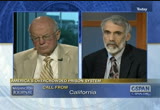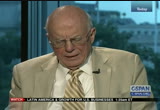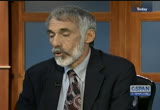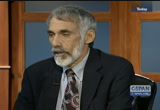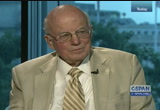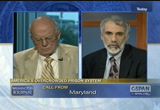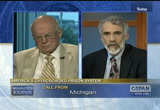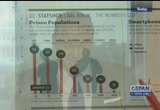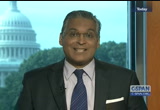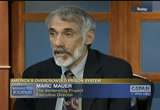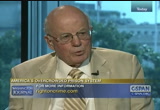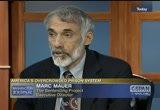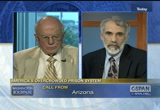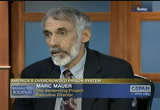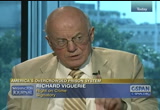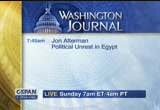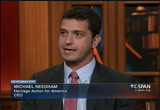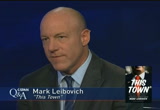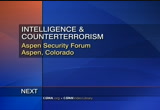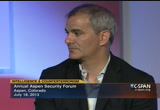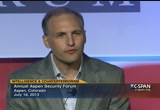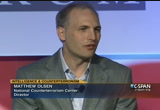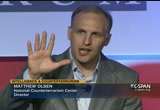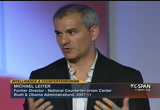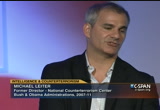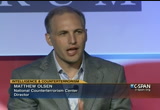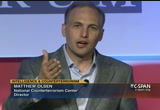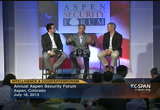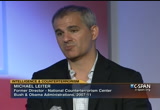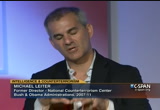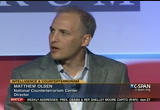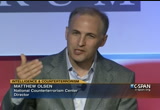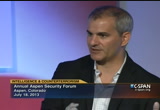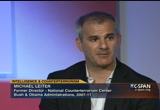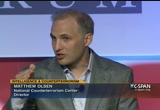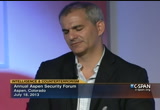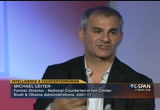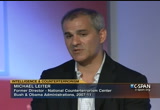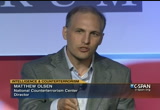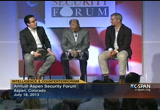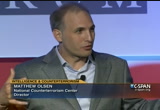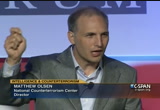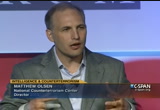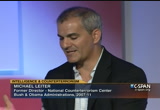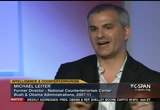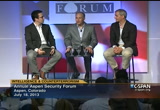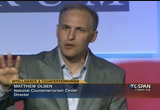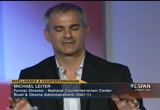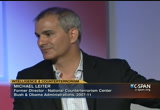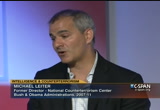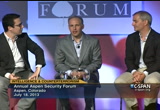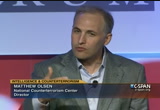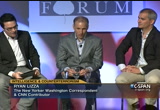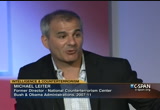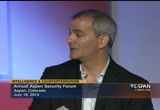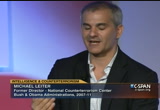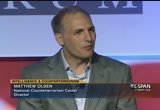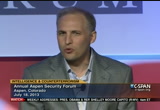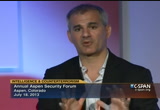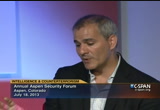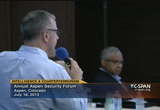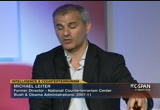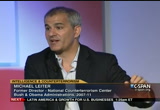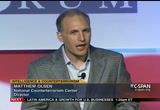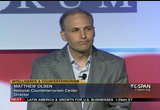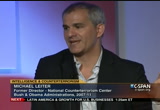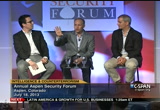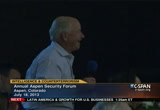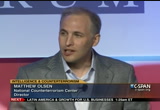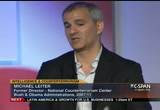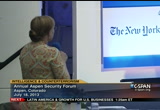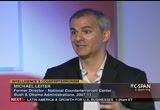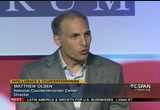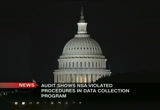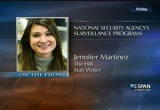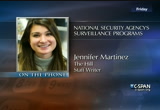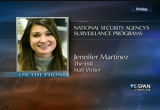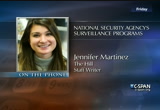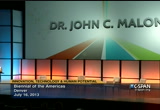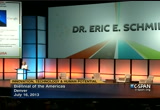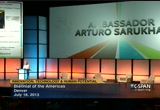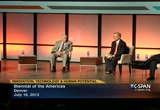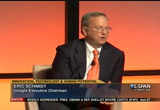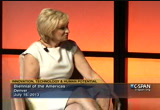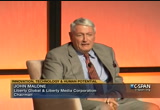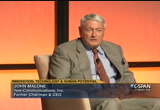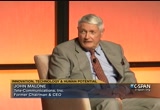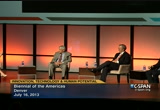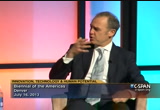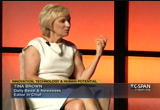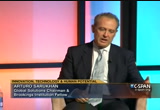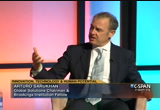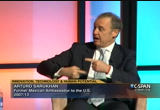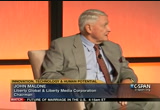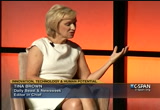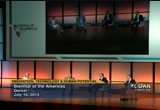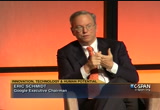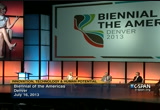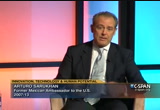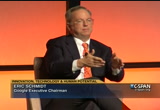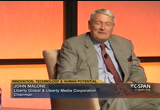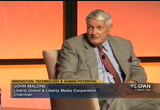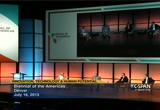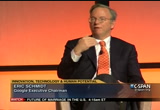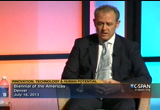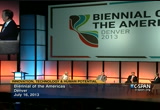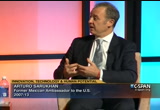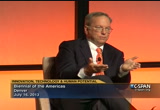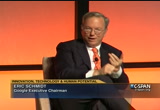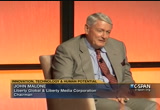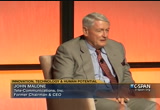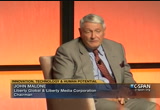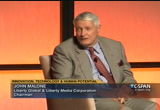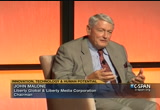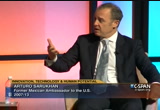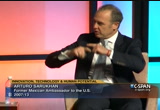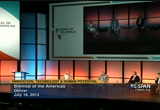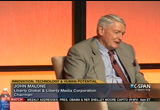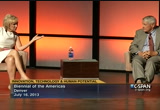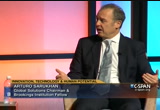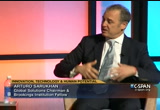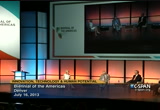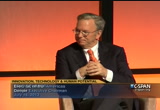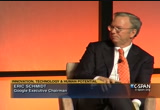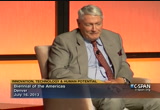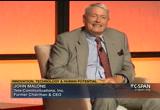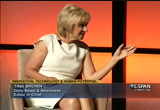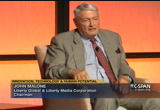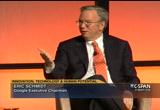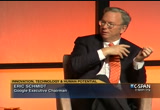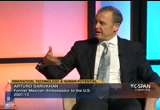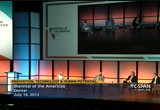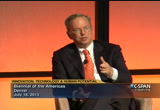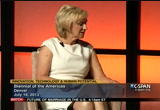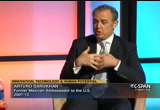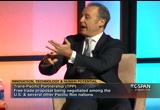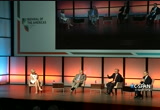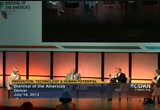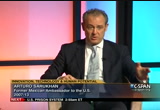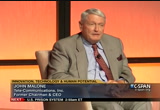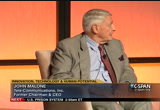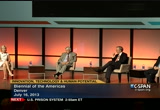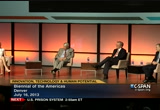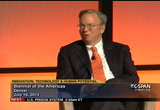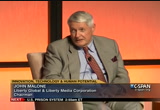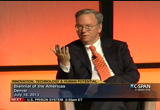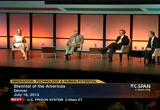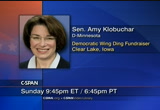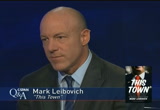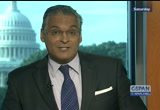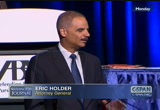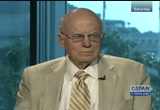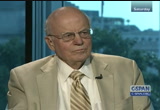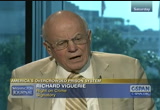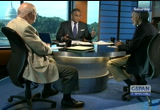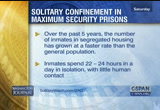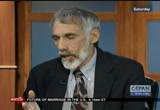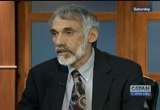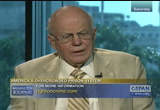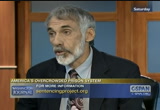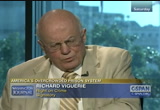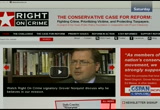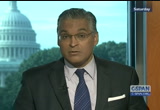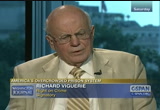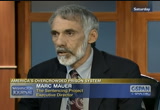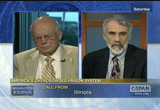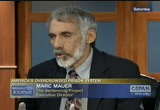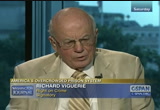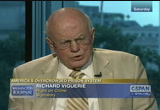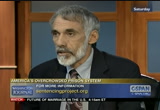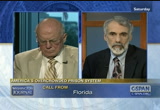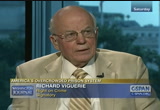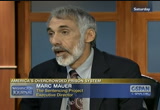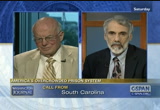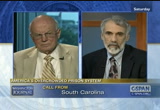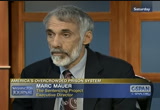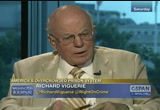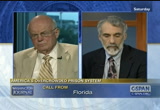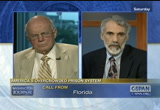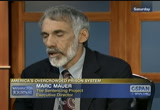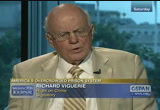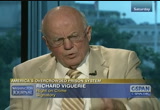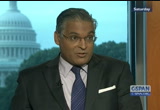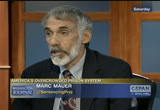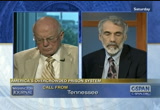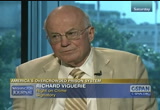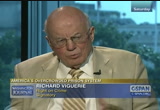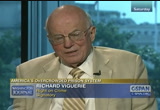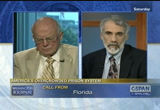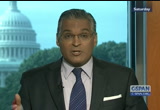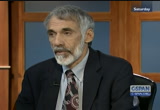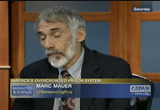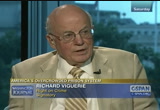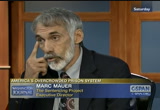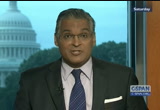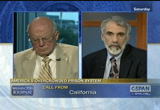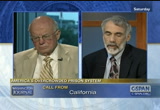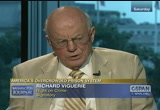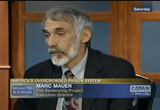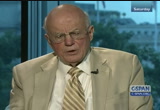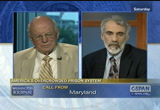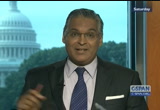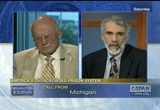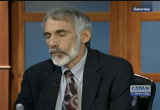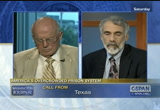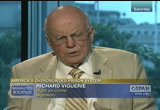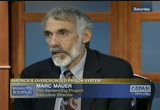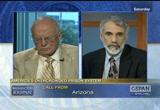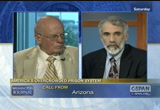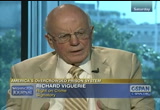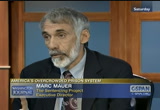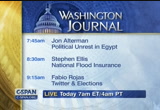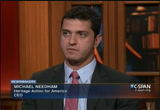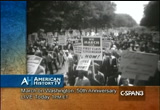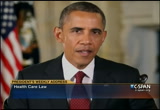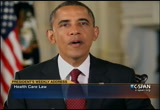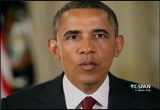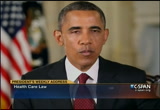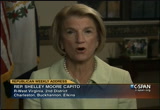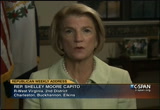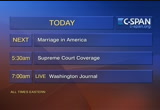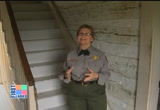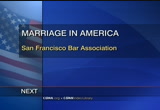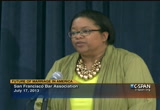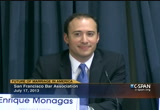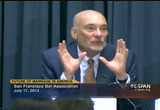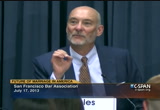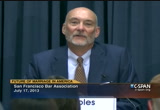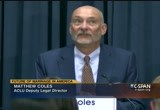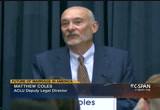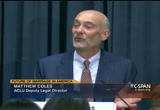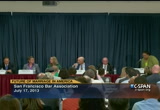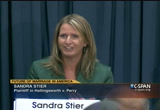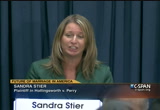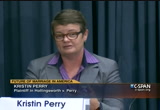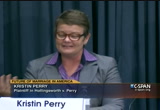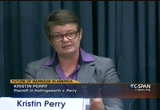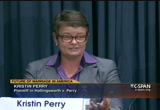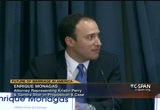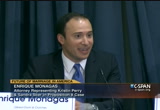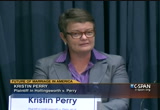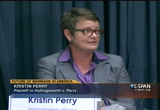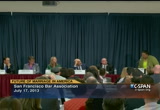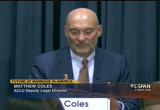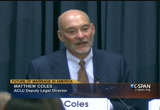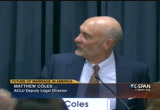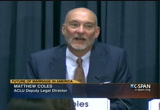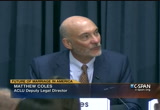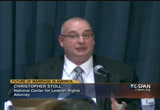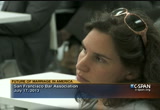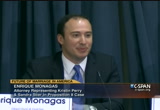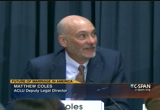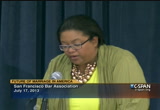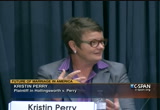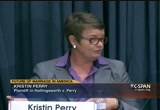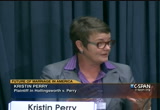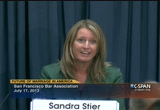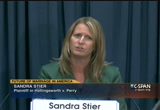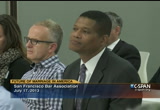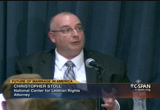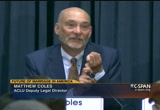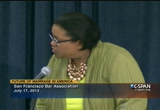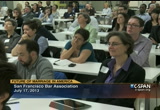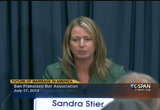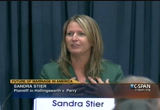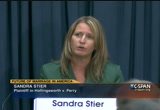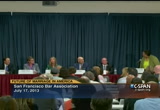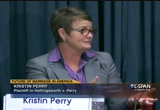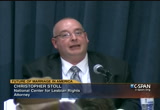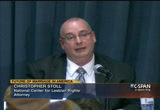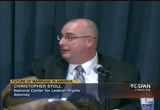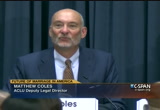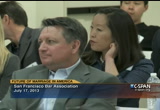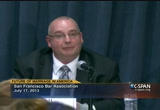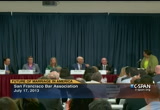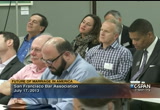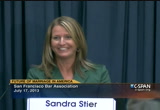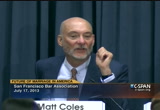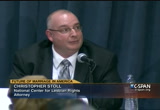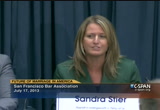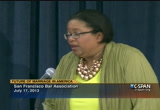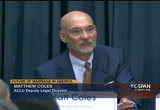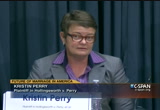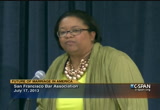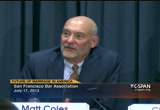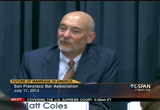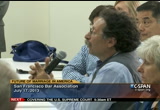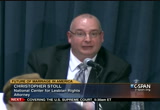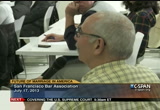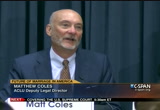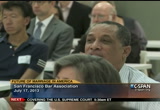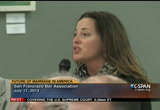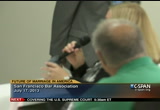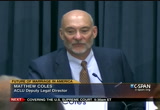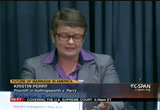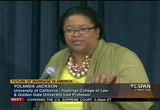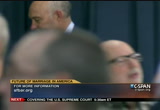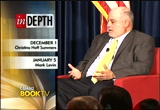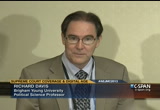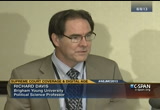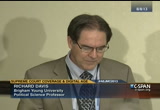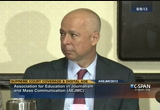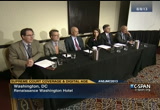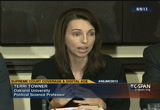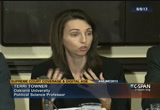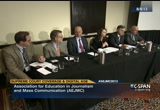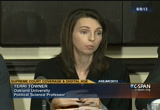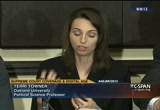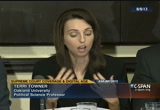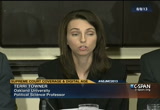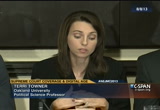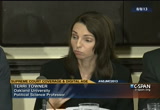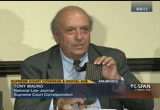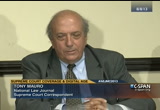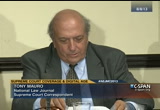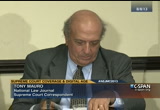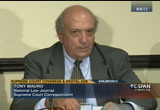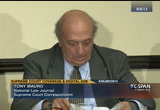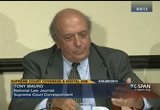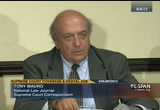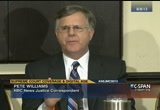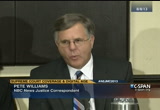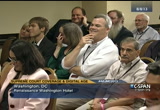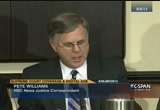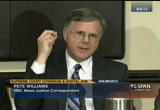tv First Ladies As Influence Makers CSPAN August 18, 2013 12:00am-6:01am EDT
12:00 am
when they get out. they're stuck with a felony for the rest of their life and they're marked. with the way everybody can pull up your background, these guys are done. they know it. they go out there and they bump their heads a thousand times trying to get work and they go right back to crime. once you give these guys some hope that are prison, you say, you go straight and we'll wipe your felony off and we'll clean it off after 10 or 15 years, then they have something to work for. but the way it is right now, every dude that walks into a prison, anyplace in the united states, can't get it expunged or anything will work. >> thank you. >> an interesting point that tom brings up. and i applaud him and it sounds like -- i applaud that.
12:01 am
but one of the many things that we can look at as legislatures and governors is licensing as a barber or a mechanic you have to get licensed and you can't get a license if you've been in prison. it's just seriously broken trying to help these people when they get out. why should the fact when you're prison years ago prevents you from being a barber's license. >> what about the permanence of
12:02 am
12:03 am
to catch up. host: what is available in the prison system, it goes to that idea. to help that transition out. guest: a lot of the money being spent to build new prisons could be spent on helping these people get back into the community and earn a job. points.e some good i was in the women's prison a few months ago. the woman i was in there with, she told me the nice building across the street, it used to be a college library. she was allowed to go there for 15 minutes once a week. how is that going to help her get back into the community? guest: richard is with the group right on crime. we're also joined by mark bauer of the sentencing project, he serves as their executive director. in light of announcements made by the attorney general this
12:04 am
week. lidia is on our others line from maryland. is a godsend. 16 years ago, i had a son who started using drugs after the death of his son, but he was gainfully employed the whole time. the first time he attempted to sell a $10 bag of drugs, he sold it to an undercover officer, who was also a godsend. he was arrested. in the district of columbia. his case was sent to the drug courts because he was a first- time offender. after the probation report, the officer came and spoke to me -- he was ordered into drug treatment at second genesis for six months, and after 30 days, he was allowed to have visitors every week. therapy, group therapy. when he was released, he still had continuous therapy. he got a job. he went to the court every week for drug treatment. the judge told him that he found -- if he found him using drugs one time, he would be sent back
12:05 am
to jail. he has been clean ever since, gainfully employed, and a productive member of society. i think god for the drug court. host: that was from lidia in maryland. trenton, michigan, christopher, good morning. caller: good morning. yes, i just wanted to talk about education and programs available . i was previously incarcerated michigan, andin there were no programs available . i was the only person that i had ever met that had done this. i switched around for prisons in two and a half years. -- four prisons in two and a half years. you could take college courses,
12:06 am
but you would have to have the money to do so. you guys have already talked -- luckily i had a good family who helped me out, and i was able to take university courses and continue my education when i got out. however, i did not have a drug crime. that ifanted to note you do have a drug crime, especially nowadays, everyone is going for some kind of secondary training or post high school training -- there are no industrial jobs left. they really do not exist. it is like 8% of the jobs available. host: thank you. i wanted to bring out a graphic in the "wall street journal pose quote that talks about prison populations compared to other countries. journal" thatt talks about prison populations compared to other countries. how do other countries deal with
12:07 am
this? guest: the united states has become the world leader in how we use incarceration. underlined by our greater crime rates. other countries have less long- term prison sentences. they still send people to prison. generally speaking, they do not send them for nearly as long as we do here. the average burglar, car thieves, drug possession case is going to get less time in canada, england, france, and this is not a scientific process necessarily where we have determined exactly five years or 10 years the appropriate amount of time. it is cultural and political. other nascent -- nations have taken a very different approach. host: jan is up next from irving, texas. caller: good morning. thank you for taking my call. when did we start -- taxpayers start paying for private prisons? who started that program?
12:08 am
since we have a lot of people in jail from smoking pot, which is now becoming legal, it seems kind of silly. that population could be reduced. the private prison industry started in the mid- 1980s when prison operators came to state and local governments. it has actually been much more -- the growth has been with the federal government rather than the states. democratice for both and republican administrations, very rapid growth. there is not a lot of people in prison for smoking pot. a lot of them get arrested for possessing or selling marijuana, but the drug offenders in most ,risons are there for cocaine crack, heroin, methamphetamine. it doesn't necessarily mean they need to be there. we do need to separate out how we look at these issues. guest: before our time is up, i wanted to make one important point which i've talked about.
12:09 am
we have identified many areas that we can agree on, republicans and democrats, conservative and liberal, and we do not need to identify the difficult issues that are going to divide us, but there are so many issues -- one of my issues that i keep thinking about -- 37 states right now have on the books a lot that if you are a woman in prison giving birth, you must he shackled. your hands must be tied. your feet must be tied. how dare barrick is that -- how barbaric is that? it is barbaric. 37 states have it on the books. guest: it is security. guest: that's right. we can all agree on that. but get rid of those rollout -- let's get rid of those laws. there are many issues where we can come together and move this process forward. it is a humane thing to do. host: does this issue affect the
12:10 am
juvenile justice system as well, as far as overcrowding? guest: it is very similar. there have been harangued us conditions in the many juvenile institutions. the good news is there has been quite a bit of movement among juvenile justice professionals, the advocacy community. the number of kids that are held in secure institutions has actually been declining what substantially over the last decade. a reduction of about one third overall nationally. i think it is because people are coming together, both looking at the research, looking at brain development issues, looking at what works with kids. as harmful as institutional life can be for adults, it is probably much worse for kids in their development the years -- development oh years. we have seen the development of community-based approaches, no adverse affect on public safety. much better outcomes. host: one more call from tucson, arizona, from i can caller: -- from a corrections worker.
12:11 am
caller: good morning. i will try to be brief. my 30+ years, recently retired as an administrator with the department of justice, federal bureau of prisons -- real quick -- the majority of inmates i have seen in federal prison system, the majority of inmates are illegals, aliens that have been caught transporting drugs into the united states from mexico, that's one, and the other ones are native americans that commit crimes on reservations. those are the majority of inmates you will see in the federal prison systems. i have rarely ever seen an individual who is caught with a couple of grams of anything and sent to a federal prison. if they do, they have a rap sheet as long as my arm.
12:12 am
they have committed armed robberies, home invasions, everything you can think of and they have committed a federal offense. host: any comments? guest: there are many people in prison who have long rap sheets and many things have happened. maybe we did not do good interventions early on. not everybody in prison is a low level drug offender. we've gotten to the point that by focusing resources inappropriately, i think, and excessively, we have not given ourselves the opportunity to make distinctions between people who present a truth that to the community and people who can be handled better through other means. host: as we stop this discussion today, where do we go forward as far as the populated -- as far as the prison population? what should be next? what should we look out for?
12:13 am
guest: the legislators -- at the local level, city, county, state officials should begin to look at these issues and begin to address them. that's where the real progress is going to be made. we have talked about only 14% of the federal prisoners are in federal prisons and they are in there for pretty serious things. there are not a lot of low level drug users in federal prisons. the progress will have to take place at the state level and we need to move forward. you talked earlier about the juveniles in prison -- a well- known motivational speaker years ago said the person you are right now, you will be that same person in 10 years except for two things -- the books you read and the people you associate with. we send these 18-year-olds in for one offense and they will come out in five or 10 years far worse than when they went in.
12:14 am
guest: the attorney general's call is a rallying cry for the whole country and initially for congress to do with they should be doing but around the country as well. to hear this message coming from the top and building on a decade or more of change and reconsideration of policies, i think, should give us hope we can move forward in the next decade and achieve fewer people in prison and continued reductions in crime. host: we have been talking with marc mauer and richard vigueire, thank you for your time. >> on the next "washington journal," discussion about the political unrest in egypt with jon alterman of the center for strategic and international studies. then taxpayers for common sense vice president stephen ellis talks about the national flood insurance program and how a new
12:15 am
law is causing rates to rise. after that, we look at how social media might be used to help predict the outcome of u.s. house elections with indiana university professor five io -- fabio rohas. your calls, tweets, and e-mails along with calls beginning live at 7:00 a.m. eastern here on c- span. ," ours weeks "newsmakers guest is the ceo of heritage action for america. he talks about his organization's agenda and its position on issues pertaining to health care and immigration. here's a preview. [video clip] >> in this environment right now, it is very difficult to handle immigration the way we should be. which is bypassing piecemeal pieces of legislation, getting the border secure. we also have a gigantic imbalance between labor supply and labor demand. all of those questions do not require amnesty. you can get all of the economic benefits that people talk about
12:16 am
in fixing our broken immigration system without giving amnesty at this time. that is the position we support. unfortunately in this environment right now, the moment something passes the house, the pressure on immigration, which has dissipated over the last couple of weeks and months, will immediately be back in the forefront. >> you can watch the entire interview with michael needham of heritage action form for america on newsmakers -- on "newsmakers" sunday at 10:00 a.m. eastern and 6:00 p.m. eastern here on c-span. what is interesting about washington in this age is that once you have that title, even if it is a very short title, even if you have been voted out after one term, you can stay in as a former chief of staff, a former congressman, former chief of staff to congressman x or y, and that itself is marketable. you are in the club. departurestriking
12:17 am
from the days in which people would come to washington to serve, serve a little bit, and then go back to the farm, which is how the founders had intended it. there is a new dynamic now. a lot of it starts with money, and the money available, and resources available for people to do very well. >> sunday night mark leibovitch with an insiders look at government and media in washington at 8:00 on c-span's "q&a." a discussion about intelligence gathering and counterterrorism efforts with former national counterterrorism center director the collider. and matthew olsen who currently serves in the position. they were part of last month's annual aspen security form in colorado. this is an hour. >> we are probably at that point in the day where everything has been said that not everybody has said it.
12:18 am
hopefully we will try and move over for two topics we have not and mix it up a bit. very excited to moderate this with two of the best in the -- matt here.matth ols olson is the current director of ct. nt foras been general counsel the nsa, acting assistant attorney general for national security, and special counsel to the fbi director. his predecessor at the end ctc -- the nctc is mike leiter. he was the second director of the national counterterrorism center until 2011. he is now senior counselor to the ceo of the data analytics alantir technologies. he is also a national security analyst for nbc news. why don't we begin with a very
12:19 am
,road question, and that is what is the current state of the threat from terrorism? where does it emanate from and how serious is it? why don't we start with you? >> it is great to be here. it is daunting to talk about it. we have talked about a lot of subjects today. i will give it a shot. i would say right off of the top the threat is very different now for what it was 10 years ago and even 4 years ago. thinking at a couple of different levels. as have been noted, the threat from al qaeda and afghanistan is really significantly degrading. we do not face the same rate as the same attack as 9/11.
12:20 am
the group is really struggling to survive to recruit and train and operate. it still is -- it remains at the vanguard of the movement. is still looks to for leadership and guidance from the affiliate groups and to mention the one that concerns us most. that group in yemen has the capability and intent to carry out attacks against us. they have tried three times to take out airlines over the last few years. beyond that, beyond the affiliated groups, we talked about this, the whole expense of unrest and turmoil in north africa and parts of the middle east have led to the rise of the loose network and temporary groups like benghazi to carry out -- the group that carried out the attack against our facility in benghazi last year.
12:21 am
those types of groups deftly pose a threat was in the region. they are less a threat here at home. the final group to mention it is very quick answer is the threat from homegrown extremists. the attack on boston is the more clear example. the challenge for us as individuals like the tsarnaevs is and they do not hit our radar. they do not travel and communicate in the same way learn what they need to learn the internet and become radicalized of the internet. from that perspective, it poses a real challenge. as would brief the threat, overall, i would say it remains persistent. it is increasingly complex and diverse bit -- and diverse. >> first of all, always good to be here. thank you for another great event.
12:22 am
i want to commend matt for the great job he has done. but also, i think people should understand modern government. it is a really big deal for a current and former to sit next to each other. a lot about matt's confidence as sit next to a guy who can say anything the hell he wants. i agree with his assessment of the threat. i would add a couple of small items. we have actually done, would've talked about the threats and other places that are terrible in the world. we have to remember how successful the counterterrorism activities have been over the last 12 years. if i asked a group like this on september 12, 2001, and the americans will be killed in the united states i al
12:23 am
qaeda my guess is that answer would be about 1000, 10,000. i am almost certain nobody was a 18 house and which was the -- 18,000 which is the total number of people killed by al qaeda in the u.s. in the past 12 years.-- 18 which is the total number of thele killed by al qaeda in u.s. in the past 12 years. the threat is accurate. we also have to look at this and understand that we are never going to see any of these threats entirely but prevent a catastrophe. will be susceptible to the smaller scale attacks we see like in boston. i would add we are always focus mostly on outlook item. -- al qaeda. people started to be, slightly more aware of the threat of extremism mostly from has below qudsmely from the iranian
12:24 am
force and hezbollah. if we approach a conflict with iran, we will undoubtedly face a renewed and invigorated shia- inspired terrorist threat. we have seen some of that already, the plot against the saudi ambassador in washington, and other attacks overseas. the hunterething for terrorism community we have to make sure that we keep our eye on. >> in addition to what mike said, it will encapsulates the complexity of the challenge but to focus on syria. in syria, we have the opposition to the assad regime. in the opposition, a growing extremist group that is seeking to become an official affiliate of al qaeda. it is probably the most capable fighting force
12:25 am
within the opposition erie it -- opposition. we have a shiite extremist group, hezbollah. then, within that, we have the existence of chemical weapons. on top of that, the biggest concern is the flow of foreign fighters to syria. it has become the dominant battlefield in the world. we see foreign fighters one from western europe and in some cases to the united states to syria to fight as part of the opposition. the concern going forward is these individuals traveling to syria, become radicalized, trained, and returning as part of a global jihadist movement to western europe and potentially the united states. it really elucidates the ways the threat is complicated and again persistent.
12:26 am
>> i want to ask you about president obama's may speech on terrorism. we are at a crossroads. we need to ask ourselves hard questions and how we should refer to them. what did the speech change and what does it mean for your mission and had to change it if at all? >> it was an important speech. i am lucky to be there. i took some analysts -- no, sir. not at all. we're at a crossroads. the president in some ways, this the counterterrorism community so many in this room, it really challenged us to do two things. to think hard about the threat and to be very precise and rigorous and how we defined the threat and not fall into traps
12:27 am
like we fell into are sought after benghazi of a binary choice. it is either al qaeda or not. that is not the reality. it is much more complicated. it needs to be careful in how we define who is al qaeda and what is the threat because of course how we defined the threat is the crux of the developing a strategy. that's the second part of how the president challenged us. how to think of the threat as we look to keep up the pressure but also look to a time when we are not in a state of war. that also was a way in which he challenged everybody in this room who is part of the conversation. >> how important was that speech as policy? >> i think it is a critical speech. generally, i align myself with almost everything the president said.
12:28 am
12 years later, it was probably the most copperheads of-- comprehensive statement certainly by this president about how the u.s. government and i lies should approach terrorism -- and allies should approach terrorism. i do not mean this as a political critique but as a political counterterrorism professional critique. there were some things that were not in the speech and part because his a president and you will not get into detail. the question for the national security community which is key is to name a few is there really was discussion on homegrown terrorism. this is probably the threat most relevant to most american lives. it may not be the greatest threat but the most frequent threat and we have a long way to go.
12:29 am
i was disappointed of not having any mention of mass distraction. -- mention of weapons of mass destruction. we have done a really good job of reducing access to chemical, radiological, or improvised nuclear devices. but talk about a game changer. a terrorist use of any of these tools would be significant. the last piece which matt has to deal with is not that we have changed the way in which we look at this threat and how we address it, what does that actually mean for programs and budgets and government organizations? ash carter did a brilliant job this morning of talking about those concrete churches that you have to make when you face it. strategicw had the playing field aptly described by the present -- president. when you look at 20%-30% budget
12:30 am
cuts, how will you actually allocate those finite resources in a sensible way across the counterterrorism community? our policy role has an enormous role in that process. it is not one that the u.s. government has proved particularly effective at dealing with. >> i do not necessarily disagree with anything mike said about these issues. it was an hour-long speech. it covered a lot of ground. >> an hour and 15 minutes. >> series people thinking about these questions -- on the wmd issue, i would reiterate what tc, theid, for us at nc likelihood is low, but the consequences are extraordinarily high. for that reason, we keep our eye on wmd threats. i want to ask you about counterterrorism partnerships. the last few years, we have been told regularly that two developments would damage our
12:31 am
partnerships abroad. one, the leaking of classified data, the wikileaks was supposed to be extremely damaging, and now revelations from edwards noted. two, the arab awakening, which has led to the weakening or overthrow versions that have been cooperative with us. , what is theu sit fallout from both of those developments in terms of intelligence sharing and cooperation? >> let me take the second part first, the arab spring or arab awakening. al qaeda did not have anything to do with that, but they are trying to take advantage of what is happening in these countries. think it is important to say, it is not one dynamic in every country. in other words, if you look at tunisia, libya, egypt, yemen, mali, each one is quite different in how the change and turmoil in the region is affecting those countries. the primary way for us that it is affecting our counterterrorism efforts -- it
12:32 am
is placing a greater degree of importance on developing our relationships with these emerging regimes. -- we seewhich really a decrease in its capabilities to carry out any sort of counterterrorism effort -- we need to figure out how we will work with the new emerging capabilitiesnd the are really wanting in large part. gotten -- weve have a good relationship. and improving relationship with the president. in each country, we need to stay engaged and work with the legitimately selected government and those countries -- in those countries. benghazi really shows why it is hard. these are dangerous places. having our diplomats and our military and our intelligence
12:33 am
officials in these locations carries with it inherent risk. >> on the leaks, is there anything, and he demonstrated reduction of intelligence sharing because people will say, the united states cannot be trusted with secrets anymore, everything leaks out? >> it remains to be seen. i am worried about that. i am worried about what a read with respect to europe and our european allies, how they may be reacting to this. i think it remains to be seen. be a diplomat, and i do not have to anymore. >> first of all, i will be shocked if there are not indications within intelligence that al qaeda and al qaeda affiliated groups do not change the way they operate based on these leaks. we have seen it in every other leak situation. it happens. it makes matt's job harder. second, i was the director immediately after wikileaks, and i can tell you that every place i went overseas, for the hour-
12:34 am
-- weeetings, we even easily had half an hour of that of me having my head bitten off and getting yelled at our foreign colleagues saying, how could you be so sloppy? why can't you control information? we will not share information with you. >> for those idle threats? the britsis not that are going to stop cooperating with us. it is not if the french get a tip about a bomber coming to the u.s. tomorrow that they will not tell us, but they are going to be much, much closer holding on information they collect to understand the environment. it undermines those relationships. quietly not least, the understood relationship, partnership at times, between the u.s. government and very, very patriotic american companies has been really important in national security matters. owing back to world war ii.
12:35 am
, andam a multinational ceo i have been cooperating with u.s. government because courts tell me to do it this way, and now suddenly my market is getting killed because everybody is holding up the fact that you do not want to work with x, you should work with our company, because if you work with them, the nsa gets everything, that makes future cooperation on national security issues, in accordance with the law, much more. -- difficult. -- much more difficult. on our adversaries, what they are doing -- we have seen in response to the snowden leaks affiliatedda and groups seeking to change their tactics, looking to see what they can learn from what is in the press and change how they can communicate to avoid detection and avoid our surveillance. >> i think there is a lot of does andbout what nctc
12:36 am
its role in the larger counterterrorism world. some of thelk about central roles that it has. one of the changes that happened on your watch, mike, was the calling of names for targeted killing removed from the national security council and the pentagon to being centralized at nctc. there has been controversy about that. can either of you to the extent you can talk about it, what is the role in developing and calling the targeted killings, the list of names for targeted killings? is it accurate the way i explained it? entirely, but you know, i will narrow it a bit. fundamentally, this is a criticism we heard from congress and elsewhere. i s chew it out there. eric schmidt and others wrote
12:37 am
about this. had an "kille cia list." had another one. the lists do not match up. that is not entirely true either. had the possibility that you have people responsible for operations making intelligence calls about how bad somebody is or is not. that can lead -- i'm not saying there were -- it can lead to presumptive -- to some perverse incentives about how you draw these analytic judgments about who is, no kidding, an imminent threat to u.s. national security because they are plotting in such a country. what our role became, and i think it is appropriate, nctc is made up of analysts from at the eye and cia and dod, and it is operational to any arm, we can work with the entire community and say, yes, it turns out that we see mr. smith is in fact plotting.
12:38 am
he is an imminent threat. as long as there are legal believe he which you falls into that category, this is where we would prioritize him targeted, and, the like. i think that was a very important role. the other piece i would say is nctc in the policy role worked hard to develop options. a lot of people now say, the u.s. government is not capturing people. it is killing them instead. in my experience, the idea that anyone did not want to capture anyone you could was flatly crazy. if you could capture somebody, you capture them. a lot of circumstances, you cannot. nctc worked with the inter- agency, dod, the fbi, and others to develop the options of what you could do with someone if they were captured on if they were arrested, things like that. i thought that was a valuable
12:39 am
role, to make sure that there wasn't interagency flavor to that decision-making that ultimately led to decisions that the national security council at the white house. >> i will answer it this way. we are approaching 10 years in existent -- existence next year. building on the work that mike did, and before him, scott redd, and before him, john brennan. we have worked to become a center of gravity on the analytic side and the planning side. a second assis for an example, the white house now ,ooks to nctc to take a look at what is the threat going to look like after 2014? very strategic. they are also looking at nctc to describe, who is this guy? what is his role? what is the intelligence on him? one of the benefits that we bring to that is everything we do in that regard is coordinated. we bring together the
12:40 am
information. john mclaughlin talked about the critical role of using information. that is the bold idea that animated the creation of nctc. it is not only information, but people. analysts and officers from around the community work together and produce a product, whether it is about the threat strategically or an individual moving tactically, that represents the view of the entire intelligence community. and that is presented to senior policymakers, it reflects that entire coordinated view. that is really valuable. >> another issue that has come up in the last year with nctc is the data that you do not have access to and want. last year, you change the guidelines, the federal guidelines from the 2008 guidelines, and the new guidelines allow you now to basically get access to any government database. when this debate happened in the
12:41 am
administration, dhs objected to one database that nctc wanted. you got the rule changed. one, take me through that debate. what was the thinking behind changing the rules, which a lot of privacy advocates are not comfortable with? what government database does nctc now have and collect that it could not collect under the 2008 rules? how are you using these databases? why shouldn't i be completely terrified by this? >> you should not be terrified by it at all. this effort was started under mike. i will put my arm around mike here. a couple things off the top. this could get a very wonky very quick. i will try not to do that. we do not collect any information ourselves. we get information from other agencies that themselves collect it, whether it is nsa, cia, or dhs. we are not collecting it. this is been lawfully collected. -- i know mike
12:42 am
can speak to this more first- attack --me after the attempted attack on christmas 2009 could we do not have access to information that would help us stop the next underwear bomber. we had great access to threat information coming to our cia,ts provided to us by intelligence reports from nsa, but what we do not have was the type of access we needed to non- terrorism databases. information about individuals applying for refugee status in the united states, or individuals applying for visas or to travel to the united states. havewe needed to do was that information, not just have it for a minute or a day or a week, but to have it for a long enough time so that when we get threat information from the caa or a source overseas that says, this guy is a bad guy, and all we have is in a more first-hand, what can we do to compare the information to the other information that we've also
12:43 am
lawfully collected that the government has about people who are traveling here or are seeking asylum here, and mary that up so that we can take that information and provided to those agencies, fbi in particular, that can act? it is my perspective that this is something the market people thought we were already doing and would have been surprised to learn if we were having trouble doing. we worked very hard to work with the civil liberties and privacy community, as well as our dhs and fbi and other agencies involved, to increase our access. >> what was the objection from dhs on the initial request for the database that so worried the chief privacy officer? she said this would be a sea change in the way the government interacts with the general public. >> there is a concern -- i understand the concern about aggregating data. dhs andclosely with with privacy groups that design rules that would protect the data.
12:44 am
all the usual things you would want and expect. audits, training, oversight to make sure that we are doing this as carefully as possible. we worked with the department of justice ultimately to have new guidelines that are approved by the attorney general. i am going to weigh in here. beautifully, carefully leaked statement by one individual in dhs about how aey talked about this being sea change. there were many other parts of dhs that absolutely wanted this to be done. matt is right. of course there are civil liberties issues. we are both lawyers. we do get these issues. you have to understand the whipsaw that people in that position, when i have my position -- had my position, can find themselves in. a few months before christmas day, i was up arguing for the extension of the patriot act. had a congressman after
12:45 am
congressman, senator after senator say, why do you need to spy on america? what is going on? i have people yelling at me saying, why is my constituent blacklisted? why are they on the no-fly list? three months later, christmas day, why aren't there more people on the watchlist? why aren't there more people on the no-fly list? why aren't you spy on more americans? why can't you collect more data? these issues about u.s. persons, they are real issues, but we've got to, in my view, stop going back and forth, trying to grab it at the right time, and get somewhere in the middle. the perfect example on this for bill smith comes into the united states and january 1, and under the old guidelines, 91 has later, that information to be flushed from our system. 91, if you got a tip
12:46 am
from the cia that this phone number was associated with al qaeda, and that was bill smith's phone number, we would not know. imagine that hearing. the issue was, how long should nctc be able to keep this? fully in conjunction with the people who collected the information in the first place. the auditing, the review, trust and verify, and frankly the old system was not calibrated post- 9/11. it wasn't however it did post- 2005. they were fundamentally guidelines from 2000. the world had changed and expectations have changed. >> we adopted these new guidelines. we put them on our website. on the whipsaw, i still have a crick in my neck because last , we had this great forum with civil liberties and privacy representatives from the aclu and a number of different groups
12:47 am
on a wednesday, very concerned data,our aggregation of watch and practices, as well as was oneleaks -- that day -- and less than 24 hours later, i was in a congressional hearing where the focus was on boston and our failure to do arnaev. tamerlan ts it was a complete 180. maybe that is about right. i am concerned when that happens for the intelligence community and intelligence professionals who need predictability. they need to be able to know where the line is in order to do our jobs. that kind of swing of the pendulum is very problematic. >> it seems like this is an issue you will be dealing with a lot more going forward. it seems like the first decade of the nctc, you built up a lot of capabilities with overseas intelligence agencies, strong partnerships, but increasingly,
12:48 am
you are looking for both data sets that the u.s. government has an state, local data. it seems like that penetration into the domestic sphere gets people a little bit more concerned. talk to me about that, but also about going forward, the relationships you would like to build with state, local officials and the intelligence that they have. good part of his conversation could this has come up a couple of times today. -- conversation. this has come up couple of times today. i do think for the last several years, particularly under mike, we made real gains and how we tcteract at and see -- at nc looking overseas, making sure information is shared properly, making sure that we have on all of government effort when we are looking at threats emanating from overseas. it is much more difficult and challenging when you start to
12:49 am
look at the picture inside the united states. we have a much more complicated structure of fbi and dhs at the federal level, and then the thousands and thousands of state and local police departments, and then you throw in fire department. the challenge for us, and the tsarnaev brothers are examples, how do we make sure that our local police department and our firefighters who may be the first responders, when they see something that is suspicious, how do we make sure that that information gets put into the national intelligence picture so we can marry up what is seen at -- how do weel make sure that is being married up with national threats? challengeat will be a going forward, working with the fbi and dhs to design that domestic architecture in a way
12:50 am
that really starts to replicate what we have been able to achieve looking overseas. this, whatecific on is the kind of intelligence that you wish you had when you were the director that going forward you would like to have from state and local officials? >> perfect. [laughter] everything?n >> no, i do not want everything. you have to go through everything. you just want the important stuff. anybody who works in this field knows that you do not know what is important. after you've gotten it and compared to a lot of other stuff and after circumstances begin to what is aw do you get reasonable amount, protected in certain ways, and compare it and ways to try to figure out -- the whole connect the dots think is so 2001. it is utterly simplistic. you do not know what dots you are looking at good you do not
12:51 am
know which dot is meaningful until you are comparing it to others. what would i want? i do think we have come a long way. fbi has evolved tremendously good the joint terrorism task forces, the interagency, state and local, they investigate very well. what we did simultaneously was we invested lots and lots of money into useful state and local fusion centers. they get information from state and local police, and they try to correlate it. pieces are semi- independent, not completely, but semi-independent. what we saw in boston i think is that we've got to merge these two together more effectively. once you have that, you can actually have the fbi working with dhs, saying, i cannot cover tamerlan tsarnaev. we have close the case, but if you guys want to look at it with your resources, go for it. for us, what we can bring to that equation, i think, is take
12:52 am
that information about things that look significant or do not, and comparing that again in a civil liberties protected way with lots of data that fbi and dhs do not have. you would have liked to know if tsarnaev had called somebody in yemen. once the fbi closes that lead on him, nctc can play a valuable role in continuing to look at data to see if that is the case. i can't say all of that without same one last thing -- it is a harder problem -- it requires greater domestic work. we haven't really since 2001 had a great national conversation in terms of domestic surveillance. not particularly well understood by many in congress. even if we do all of these things, we cannot expect to stop all of these. hard are very, very
12:53 am
threats to stop it we will stop them in a variety of ways. we will stop them by not letting people get the right fertilizer so the bomb does not go off, as it did in time square grid -- square. we will keep them because they will not be able to use a court -- an explosive device on an airplane like on christmas day. sometimes we will stop the bleeding by having a really effective response in boston -- like in boston. some things will get through. put matt upot do is against the wall and throw darts at him. we have to make sure that matt is going to learn from the experience, but we cannot simply crucify matt and the counterterrorism professionals because then everybody leaves like me and nobody is there to defend us at all. denverent tuesday in visiting with the fbi joint terrorism task force there. i visited the fusion center, the colorado fusion center.
12:54 am
i asked a lot of these questions, how they would work together. how would boston have happened? how would that have played out here? we can always do better, but there is a pretty good set up there. i think you can go back to a colorado,rose here in the plot to carry out an attack on subways in new york, and the fbi started here in the aurora,ation of zazu in colorado. it is probably not a good idea to bring up the nsa program, since you have not asked about it, but we can talk about how zazi was an example of that. in terms of local police department working with fusion centers and the fbi, the case is a very good example in colorado of an effective investigation that ended up moving by car across colorado -- across the
12:55 am
country from colorado to new york. >> let's talk about oversight, oversight of counterterrorism and intelligence agencies. micah, you recently summarized oversight of counterterrorism this way -- the executive branch oversight, it operates in secret . congressional committees operate behind closed doors. the foreign intelligence surveillance court is largely invisible to the public. ita journalist, when you put that pointedly, none of this inspires much confidence. at the same time, these institutions could not operate wholly transparently. but the intelligence community, ,he stories today in the paper they seem to be losing the confidence of some folks in congress. why should the public trust such a secretive oversight regime, and how can we improve it? >> two things, i would say. when you see
12:56 am
people like matt olson, when you saw the general counsel from nsa, that inspires a little bit of confidence, because they are not a bunch of ogres. right? these are thoughtful people who are in very hard jobs. asond, i like to think of it oversight serving two purposes. one is to make sure government is doing things right, and two is to give the public confidence that the government is doing things right. in my experience, oversight on the first piece works really well. if you do something wrong, there is going to be a congressman or senator or a fisa court or an inspector general, there is going to be a general counsel, there is going to be a civil liberties protection officer, it that all of them, you can snow them all, and none will figure out that something
12:57 am
is wrong, but in my experience, that is far from the case. i think the oversight is working in making sure people follow the rules. your question, is oversight working in terms of giving the public faith that the government is following the rules? i do think that is where we have a failing. -- it isot independent not an independent problem of government. look at polls of how much people trust congress. not especially high. there is a lack of faith in people doing things right. i think you can increase transparency. you cannot take it too far. if you go to full transparency like we do in other areas, we will have zero security. >> what can you do? the executive branch, what can you change? host: >> both administrations should have embraced the president civil liberties oversight board earlier than they did. they should have held hearings now. it should have been a more robust oversight board which is selected in a bipartisan way, doing public hearings, 3, 4, 6
12:58 am
years ago. general can give more generic reports. congressional oversight committees, the intelligence committee can talk about the subject that they are looking at without disclosing sources or methods. john mclaughlin noted, we do public intelligence oversight hearings. that is good. even on the fisa court, i would disagree does -- respectfully with some prior panelists. they can release some things. they can release how many cases they get. how many are denied. how many are sent back for review. the general types of issues they look at. you can have periodic review by other bipartisan commissions that have credibility. you can do it incrementally. it is good to be difficult to swim against the general tide of distrust of government. i would also be remiss if i did not say, i personally could not disagree with anthony romero did us at snowden
12:59 am
service. i think he did this country an incredible disservice. we are now going to have slightly more transparency and better oversight. that is a good thing could i refuse to give mr. snowden credit for that. >> will you give snowden any credit? >> no. on the oversight piece, i think the 2008 changes to fisa and the 702 procedures we talked about so much today, it is a real example -- it is hard to imagine an oversight regime that can exceed what we have done with fisa, and in particular with 702, where there was a public debate when the law was changed where the fisa court reviewed the nsa's procedures, where congress was directly involved in making those changes to fisa, and probably a lot of folks in the room do not realize that in 2008, the fisa court of review issued an opinion that upheld all of the ways in which the nsa
1:00 am
, and looked atm this exact mechanism of targeting non-us persons overseas and upheld it against a constitutional and statutory challenge. that probably has not been reported very much. that hasn't been reported very much. that is a declassified opinion of the fisa court review. then, you have ongoing oversight of the program carries out. it is hard for me to imagine and oversight regime that would exceed that. >> i don't think you were using your imagination. you have to look at the fisa court. >> there is no adversarial process when a prosecutor goes and seeks to get a search warrant. you go to the judge and present the facts. it is not adversarial. i am not aware of any country that has anything like a fisa court. you could make it adversarial. you would slow down.
1:01 am
unless you did it very carefully, you would risk disclosure. the problem is that there is just a lack of confidence and that is a problem we have maintaining these tools in government. you wrote in one of your pieces that congress was somewhere below headlights and above people -- >> yes. >> that is hard for us. we depend on a relationship between communities to provide legitimacy for our programs. >> the question also is. where is the abuse? i completely understand that some people think the collection itself is the abuse. the fact is, the collection in that program has gone through our democratic process of government and the systems we set up.
1:02 am
then, the question is if the collection is not the abuse, where has the collection of information been abused? where are the results? where people have been arrested, persecuted? so far, i have not seen that. its not that we don't have to have oversight, but we can't just rush to the darkest corner of the room and assume there is abuse going on when we seem to have a total absence of such circumstances. >> you have some senators arguing that authority hasn't been exceeded. >> my argument would be, they have repeatedly extended the fisa act. i don't really like the image of senators not doing anything. there are plenty of senators, congressmen who knew about this program. if they wanted to stop it, there
1:03 am
is authorization acts. there are lots of ways to stop programs. the fact is, the majority didn't win those cases. >> let's open this conversation up to questions. we have about 15 minutes left. >> mike, i am chair of the homeland security committee. i will try to limit it to one question. i believe i heard you say that with the limited information that the fbi had, what was passed to them from the russians, that some mechanism should have been designed that they should've passed on to someone else, boston police, could you expand on that? if so, i understand the complexities there, who is going to do what?
1:04 am
i have an aide in my office who says, everyone's job is no one's job. it seems like that possibility could exist there. >> i don't know declassified information so i can speak about this. this is how i think you can design the system. jttf gets a tip, it could be from russians or a domestic tip saying will smith is a bad guy. guy.ll smith is a bad fbi investigates bill smith, and interviews him, turns out he is not a bad guy. closes the case. that is what happened with
1:05 am
tsarnaev as i understand it from public reports. you could have a system where the fbi earns to the same local fusion center and says, we have this case on smith, we didn't find anything. you have different authorities at a local police office. you can knock on doors, check with friends. if you want to do that, fine. we will continue to do our search easing data from other sources. this is now yours if you want to do something. in reality, most officials aren't going to do anything with that because they have other priorities. that is one way of creating a safety net below the federal investigative limits. let me just say, this is not without real civil liberties implications. i use this example with congress. this sounds great if you are dealing with someone named tsarnaev. now, let's make it bob smith in texas who is reported to be an antigovernment guy. fbi interviews him, he says no
1:06 am
way. fbi closes the investigation, handed off to police and says, you might want to keep your eye on smith out there because he has a lot of guns. do you think a few people in congress might have a problem with that? we have to realize that we could increase the safety net we have but it has implications for what state local authorities to and how that potentially infringes on civil liberties independent of official investigations. >> i completely agree. the problem is, the observation has been made that we haven't been to the crime site. our collection capabilities, the way we collect information has increased the amount of information we have. almost inevitably, when something happens like boston, we can look back and find points
1:07 am
of opportunity to engage or do more. the lesson, the difficult lesson is the fbi bases what it can do on the amount of information it has. a predicate what they do on how much information. that is a tried and true way of conducting an investigation. how intrusive you go depends on how much information you have to show that the president is violating the law. that is what we want the fbi to do. the other aspect -- the opportunity within the jttf structure, the opportunity to share with representatives if it warrants, to share with their department. >> right there. >> i am adam, the fire chief in alexandria, virginia.
1:08 am
i appreciate the conversation about state local intelligence sharing. it struck me earlier as we were having a conversation about connecting the dots that that first thing but not the only thing. there is this matter of communicating the picture to the people who need to know. that includes my people if you think of all the iconic images of these events. firefighters are front and center. what do you think we still need to do to connect the dots and communicate that information effectively to the people that are zero dark thirty? >> i will answer this way. it is an nctc program that we do with fbi and dhs. it was an organization within nctc where we had a small number of state local representatives from fire departments and police departments, and serve on detail for a year or two.
1:09 am
they can take that and turn it into, what would be useful for my department? then, we write reports. when you happen to respond -- some very helpful ways for state and local firefighters and police officers to engage at the federal level and advocate on behalf of their own departments in the community. this is a program we have continued in coordination with fbi and dhs where we have people at nctc who represent our departments and police departments. >> a huge part of this is getting beyond law enforcement. for the detection, response and prevention. the fbi was doing engagement with the mosque that tsarnaev belonged to.
1:10 am
that is great. you need lots of people other than the one carrying badges and guns to do that engagement. you have to engage the community as a real partner and not an adversary. back to your point, something nctc started right after the mumbai attack. nctc partnered with dhs, fbi and fema to do training exercises across the country about how a city should respond to multi- casualty attacks. about a year before boston, nctc with fbi, dhs and fema ran exactly that scenario with 150 plus representatives from across boston, going through those scenarios.
1:11 am
they discovered things like, we are going to have to have a process for processing the video from cameras in stores. we have to think about communications via cell phone. you're not going to stop everything but what you can do is help communities prepare for these situations and really reduce casualties that you might otherwise see an accelerated investigation. >> anyone else? >> while you're getting the microphone, it is important to think about we have about 13,000 fbi agents around the country. we have 2 million first responders. that is how we are going to stop the next boston type attack.
1:12 am
>> from george washington university, i will direct the question to matt. eight days after benghazi, you said benghazi was an act of terror. we have had a significant political and bureaucratic debate about talking points and what happened prior to that point, but what goes into the formal determination that something is an act of terror? depending on the political agenda, it could be active thuggery or an act of war or an act of terror. for those who have been inside the system, eight days is not necessarily bad. >> important point after benghazi is -- i was in a hearing that was prescheduled. in the intelligence community, i think i can speak for all of the analysts that were working on this.
1:13 am
we proceed of presumption it was a terrorist attack. you had a mortar attack that killed americans and a government facility in benghazi. they were clearly targeting our presence there. it was violence and result in death. there are number of legal definitions, the practical common sense of you that we all proceeded on from the outset was this was a terrorist attack. what it does not answer is a bunch of other questions that were more complicated and how coordinated was it? when had it been planned? who was behind it? we are with those and to this day. it was unclear then as it was now. it was not particularly coordinated.
1:14 am
it had not been planned for very long. it does not take away from the bottom line that it was a terrorist attack. those are important questions that the debate of secured -- obscured our efforts to refocus on who was responsible for what we do about it. >> the great thing about nctc is frankly the great success stories of government reform. post 9/11, i am biased, it can still do a lot of things better, but it is pretty darn good read regardless of how politically heated these discussions get, whether benghazi or fort hood, or workplace violence, i think john brennan and scott and me and matthew have really tried to keep it completely apolitical.
1:15 am
that does not mean you don't have bureaucratic fights. we called fort hood and at the terrorist a day after. with, as we see it. we are part of the intelligence community. -- we call it as we see it. i cannot tell you the politics of almost anyone at nctc. it was not an issue. people came to stop terrorist from killing americans. pretty straightforward. >> we are running out of time. one more question. the advantage of being in front. >> just to follow-up on one would think that matt said. you said you had seen al qaeda and affiliated groups changing their way. did you meet specific because of the snowden -- did you mean specifically because of the
1:16 am
leaks? can you give us examples? >> what we are seeing is individual terrorist who are looking at this and seeking ways to circumvent our surveillance based on what they are learning. from these recent leaks, yes. we have strategic problem is our problem this we cannot keep our national secrets secret. not to say everything that is classified should be secret, but the things that we should be protecting are not effectively protecting, it hurts our partners and it helps our enemies. we have to fix that. we have to reinstitute the and oversight so people say it met has been working with the congress, the house, the fisa court, that is good enough. somebody is going to change the
1:17 am
law, somebody is going to arrest matt -- sorry. i am worried what have a continued run of snowdens. >> there are limits of how transparent we can be read a little bit of a trojan horse by people who do not agree by what we are doing and knowing full well how it works. taking a more strategic view for a moment, the challenge for us, everybody who works at nctc is there to protect the country. we were reagan we talk to you in talking to you in this room about finding the right balance, but ultimately
1:18 am
i want to know where the line is that in a predictable way, how far can we go? my job is to protect the country. i want my folks to go to that line of legality and do everything that we can within the bounds of the law, but to go up to that line. as we move forward, would be to be more transparent. i hope the oversight regime can gain the ability to allow us to do our job. >> we have to leave it there. thank you for a great discussion. [applause] [captions copyright national cable satellite corp. 2013] [captioning performed by national captioning institute] washington post reportedly this week that the nsa data collection violated procedures and thousands of cases eating as far back as 2008. as far back as 2008.
1:19 am
behindntained it stands policies of reporting mistakes that might occur. lawmakers and judiciary chairman have called for more hearings on agency surveillance program in light of and information. for more on the subject, we talked to a capitol hill reporter. >> we are joined by jennifer martinez from the hill. asking forick leahy another round of hearings on the nsa? in the wakeng that of a report that was published by the washington post week thursday. has repeatedly broken privacy rules and overstepping its authorities for years. out with a statement saying he remains concerned that congress is still not giving --
1:20 am
getting straightforward answers from the nsa. >> how bad was this report says the washington post published thursday. >> it was pretty damning. it put the administration in an even worse situation with the surveillance program. it also calls into question the statements that the president made last week at a press conference at the white house or other statements that ministration officials had made. nsareport shows that the had procured by the communications thousands of times without hopper authorization. the washington post did an analysis. most of the incidents were unintended.
1:21 am
it involved unauthorized surveillance of americans in the united states. >> senator leahy will hold a hearing and looking at the specific allegations. where is congress on this? how far have they gone into the issue? any legislative solution to the issue that is in the works? been a lot of hearings in the wake of these revelations over the surveillance program. that came to light after edward snowden released documents to the washington post and the guardian about these programs. it went to that judiciary to .idi -- judiciary committee we have seen a bunch of legislation get introduced. ndu had senators wyden a blumenthal.
1:22 am
there were three bills that ourts revise how the fisa c and the surveillance programs operate. leahy introduced a bill that would narrow the phone data collection program. 215 of the patriot act. what his bill would do is make sure when the intelligence community is trying to take phone records for an investigation, they would have to roof they are only going efter 8 -- roof date -- prov they are going after a terrorist. it was a lot similar to leahy's bill.
1:23 am
closeled, but it was a vote. it shows congress is concerned about the surveillance programs and whether they are violating americans privacy's. >> jennifer mcinnis writes for the hill. tinez writes for the hill. you can follow her on twitter. thank you for the update. >> thank you. >> c-span, we bring you public events from washington directly to you. we put you in the room at congressional hearings, conferences, and complete gavel coverage of the u.s. house as a public service of pilate -- private industry. years, created wordy four ago and funded by your local cable or satellite provider -- by your ago and funded local cable or satellite provider.
1:24 am
>> a look at the ways that technology and innovation is affecting latin american countries and creating growth opportunities. it is part of the international festival called the biennial of the americans. is a little less than an hour and a half. -- i'mit enormously enormously excited to be here. it is one of the few places has anhe colors international focus. rooted in the institutional traditions like those on the east coast where i live. that youes the idea consume the world that you want to live in yourself. so much of that richness has come from immigrants. a long history of hispanic families going back many years. i think number could teach washington quite a lot about
1:25 am
human potential. when i say washington, i mean house republicans. [laughter] [applause] dark cultural forces that will have a dramatic social change -- there are cultural forces that will bring a dramatic change. forget that 73 million people have lived in poverty for the last 10 years. they want to keep pace with expectations. latin america is going to waste dining demographic shift with few young and few old and many working age people. howre going to talk about
1:26 am
we can maximize this opportunity at thelaborate with them same time, we cannot ignore the very disturbing problems that affect the region as well. there is violence and homicide rates that have reached epidemic levels. violence against women is rampant. canada and latin america do so much better than the u.s. did in its financial crisis. divide in howl different countries are dealing with the forces. some decide it is the best way to have the countries open up. up protectionng barriers.
1:27 am
keeping parts of the economy's closest to the world. interesting a very and unique discussion. deuce our terrific panelist. -- i want to introduce our terrific analyst. malone.john the chairman of liberty global. the world's largest cable company. he was cable before cable was cool. time. ahead of his he was working on a video telephone. board ofrves on the discovery communications and expedia and sirius xm radio radio.
1:28 am
he is also the largest private landowner in the u.s. next is eric schmidt, executive chairman of google. when he joined in 2001, growing google from a little start up to a renowned, global leader in technology was at the very top of his to-do list. he served as ceo overseeing business strategy along with larry page from 2001-2011. here's a vigorous diplomat for the technology world. he is a member of present president obama's technological counsel. in 2008, 8 million latin americans were active online. today that number is 129 million regular users. i want to see what he has to say about the change our world.
1:29 am
-- will do to our world. finally, ambassador arturo sarukhan, the former mexican ambassador to the united states. the longest serving mexican ambassador where he's a enormous change in making america a power. he has seen this whole trajectory take place. he's a fellow at brookings institute. he is kind of the justin bieber on ambassador row. he was the first ambassador to tweet. he now has over 100,000 followers. i hope you will tweet up a storm. welcome our panelists. let's get started. [applause]
1:30 am
>> let's start with you eric schmidt. google has been a game changer, you turned that one -- you turned all of our lives. what in your view are the ways about innovation and reinvention among what are the properties that create newness? >> thank you. and thank you, tina for putting this on and for the governor for participating in this important. we are right on the cusp of a real change in human intelligence and human understanding. all of this work that all of you
1:31 am
and these guys have done to build a society that is knowledge based means we can begin to build systems that make you so much smarter. these sorts of devices we wander around with your permission, it will help you in extraordinary ways and make suggestions of new ideas, about new things to do, about fun things, and suggestions about businesses. the advent of the mobile device, the platform means the transition to the knowledge economy is essential. that then starts really changes. the new ideas interest protection, new ways of getting around, self driving cars. enormous changes in medicine. a very good diagnostic.
1:32 am
pop a pill. wi-fi to your phone, call the doctor, tell the doctor what is going on and the doctor will call you back. all of the systems are just ready now for prime time. we'll use them because that will make our lives easier and faster. the american innovation engine and universities capital funding models is the best in the world. it will continue to produce innovations at this rate even faster. >> maybe even too fast for humans to keep up with. sometimes i worry at some away you can talk about can be dehumanizing and segregating of people because of this wildly fast technology wishes people apart as much as bring them together. >> i disagree. i would bring to your friendly teenager. -- i would offer your friendly teenager. if you have a teenager, if they
1:33 am
are awake, they are online. if they wake up in the middle of the night, they are online and go back to sleep. they are more communicative that we could have ever imagined. that hive of knowledge, friendship, thinking will propel the next generation far faster. >> john, you are in engineering by trade. you might be fascinated to see the extraordinary celebration of some of these technologies that eric is talking about. >> it seems that these technologies are curative and -- cumulative in their effect. once we got to where the scale could be propagated in massive scale, the celebration of pace of innovation took off.
1:34 am
it seemed to be everything they taught me in engineering school was completely obsolete 10 years after school. what you actually learn in terms of the technology of the day are pretty obsolete pretty quickly. what they teach at a school is to learn how to learn if it is a good school and how to adapt. the technologies that we are talking about today are really the evolution of the whole is a parallel adventures -- inventions that are combined into the type of devices that eric was pointing to. it just seems like it has opened so many doors for innovation and innovation and community. subcommunities, from invention point of view, the combination
1:35 am
they have out in silicon valley is pretty unique in the world in terms of human capital, financial capital, and entrepreneurship. it has created this. >> the opportunities being presented by the explosion of the technology in the americas from the new economic shift and geographic shift. what is your view as a great investor? what opportunities do you see that we could be exposing? >> you try to get the demand for these implementations -- inventions. geographically around the world, the power of these electronic technologies, digital
1:36 am
technologies is they are global in scope. there really is a standard that can be invented and wants the services are offered, they are available to pretty much i guess half of the planet, perhaps in terms of households. the other half needs to develop an economic base to participate which is a big challenge, by the way. the scale has never been seen before. this is the reason why some of these companies seem to emerge from nowhere and become a huge overnight because they are playing such a large sandbox. >> it creates incredible changes. ambassador arturo sarukhan you would ambassador at a time where you saw this big geographic shift and economic searching -- surging of the americas.
1:37 am
tell about your point of view and what you learnaed. >> let me simply start by saying i'm delighted to be back in denver. i said i would be delighted to be the monkey to his organ grinding. i am very happy to be back. i think as you look to the american south of the rio grande, technology has become a leveler. it does help to understand communities and public policy. technology has provided. -- first of all, an expanding
1:38 am
middle class via technology is finding new high in uruguay's of impacting the way decision- making -- new ways of impacting the way decision-making is used. there's important trend i am seeing. where middle-class maybe under strain in countries like mexico, brazil, chile, peru, colombia, the middle classes are expanding combined with economic growth shifting demographics. as a fundamental shift, tectonic shift which will change the traditional way in which north and south hemisphere have been doing everything from how do we educate our kids, what do policy look like, how do you sure the political hearties remain responsive?
1:39 am
a, do not made her across the americas. the tea party and occupy the wall street are two extremes. you are seeing it in brazil and you have seen in chile with student demand. you saw it in mexico. how do modern political processes take into account new demands? it is a common thread that resolve this together. >> what is interesting is it is ironic as the middle class expands, you glimpse into a better future that you become discontented and decide to come out and protest as was seen recently in brazil. so much of these big technological changes are leading to skewed prosperity. you are single such a concentration of wealth small pockets of the country across america as well.
1:40 am
how do we deal with this skewed prosperity issue that is becoming a menace? >> most people in the auditorium know very well that the latin american is among the poorest region. latin america have some the highest disparities a income. the challenge with public policy of how we reinvent public policy is how to ensure that people not be left behind? how to make sure from the most humble shoe shiner in the main plaza of any town or city in latin america that liberal democracy is delivering the
1:41 am
goods? there is a chance to continue to create asperity. -- prosperity. this is a challenge. it will remain there. things will increase dramatically. in some latin american countries, it'll still be an outstanding problem. >> in mexico what is surprising in talking to you, as seems like the last three administrations have been lacking on policy with programs like the additional -- cash transfer to keep their children in school which begins a cycle of getting out of poverty. >> not only keeping the kids in school by ensuring this the conditional program in which money is given to the female head of household, conditional-- >> that is really critical. [laughter] [applause] men will drink away.
1:42 am
[laughter] >> she has to go to the kids to get their medical examination and vaccinations and they have to be enrolled. if those conditions are not met, the money is withheld. it is been in place for five consecutive mexican administrations regardless of the party. it has brought 40 million people out. these programs can work to a point where michael bloomberg went to mexico three years ago to see if these issues could be brought to brooklyn and queens and staten island to generate that program to create entrepreneurship. this brings us to very important facts, the role of cities.
1:43 am
it is very fitting we are in denver that has been reinvented and has reinvented itself. cities have become the new hopes of innovation. when you see gridlock in washington, it is the mayors that is reinventing. not only the united states but in mexico city. there's a very interesting connection between all these issues that are playing out where the cities become the new hubs of innovation and diversity. >> john, you are famously a very strong libertarian. what you think about that government intervention that arturo is tab about with cash transfers increasing a social policy that does keep pace?
1:44 am
>> i am a libertarian but i am also pragmatic being an engineer. if it works, great, do it. the issue is so many government programs that do not work as become burdensome and never go away. the cumulative buildup that becomes a burden on society. it is all about education and these technologies, if they can be used to upgrade the effectiveness and efficiency of education and the quality, and the affordability, in particular, it is not just education of facts but culture of civil understanding why society is functioning.
1:45 am
why de to be conducted? it seems to me that is the core benefit to lifting the entire human race. as eric pointed out, if the united states, technology does have a tendency to create massive distribution of wealth disparities. we were speculating what the impact, how do deal with that in society? america has never been a nation that created dynamic families. our taxes and did not encourage it. encouraged to be
1:46 am
philanthropic will. phthe one topic -- ilanthropical. i think that is a good thing. philanthropy, reinvesting in a society when the massive wealth effects take place. they are driven by scale. >> relying on philanthropy can be work. america has a tremendous tradition. coming from the u.k., we do not. i found it a little exciting and revealing when i came here with just immense generosity of this country that is unlike anything i've experienced in my country. in latin america, not a tradition of philanthropy. people do not -- they are really not that point where america is where they give away huge sums of their money. in asia, of course, not at all. in india, no tradition of the b philanthropy.
1:47 am
eric, a great deal of unemployment. we talk about programs to retrain people so they learn these new skills which required the digital economy. google is never going to higher a 52-year-old man that was retrained at community college. never. it would never happen. >> one never knows. [laughter] >> there is the beached white males. [laughter] left behind on the one hand. >> white males left behind. i can see the headlines. [laughter] >> i am getting my revenge because there's no other woman on the panel. [laughter] [applause] you have kids they cannot get jobs which is causing occupy wall street. what we do about this?
1:48 am
>> let's distinguish between the developed world and developing world. in the next five years, another 5 billion of the smartphones will get in the hands of the vast majority of global citizens. in developing countries that have never had access to information, personal or political freedom, these are extraordinary devices. for them, a step from poverty to lower middle class is a very big deal. that will drive a lot of what you will see. in the more mature economies like europe which is decided for whatever reason to not grow for the next five years -- [laughter] >> a voluntary suicide.
1:49 am
>> each of these is dealing with the compounding demographic of automation. with the demographic, you have older people and a few young people, fewer people will support more people that need more support mathematically. with globalization, it is china that is raising prices. the computer took the job. that is the way to complain about it. we are shifting from resources based economies to knowledge economies. in a knowledge economy, you have to have enlightened view of what a successful. it is about education, connectivity among immigration, and the roles of women making possible for them to operate at the same level or even better. all of those had to be part of a coherent strategy. the countries they get that
1:50 am
right will growth. it can occur anywhere. we have lots of examples. israel, a very high exporter. countries which have decided to focus on the knowledge economy and they can be done in any of these countries. >> arturo, what do you think about immigration that is happening in washington? stalled immigration, how do look at from the latin american point of view? >> there is no important structural issues in the future while being prosperity and security of the united states and getting it right. [applause]
1:51 am
into the u.s. gets it right, it will have radiating effects across the americas. it's a very simple equation. you have a capitalist abundance country near labor abundant country. there are synergies with the changing demographics and by the way, it will not be there forever. the demographic and mexico and other places are changing. in 25 years, at the current rates of growth in countries like mexico or peru and chile or brazil, for example,
1:52 am
construction in long island or vineyards in napa, it will not be there. how do you build a bridge between the largest, probably best trained labor force coming into the market in latin america and the caribbean and what will happen in 20 or 25 years with the demographics are of the americas is about the security and prosperity of our nation? i know this is very divisive and has been a toxic issue in america, but immigrants are not as threatened to the security of the united states. [applause] >> i cannot find a reasonable opponent about this position. i cannot find one. let me make my case every america takes his people from around the world and educate them in the best university in america to him and kicks them out to go to start companies
1:53 am
that compete with us. taking jobs away. are you with me? [laughter] am i missing something? [applause] are we in agreement? >> we are in agreement. eric's point is valid. it is not only about the people that he needs and his sector, it is also about those in the central valley of california and construction companies in upstate new york and we called the unskilled labor. there's a lot of skill. >> we call them customers. [laughter] the other logic problem i have with this is that america is growing and with the growth comes revenue growth, gdp. the government has need for taxation of all the programs. more customers, more taxpayers. what am i missing? >> there's tremendous fear that
1:54 am
they were voicing in the house was that they are going to take american jobs. they are coming to take our jobs. >> and they are creating jobs. the economic data supports my position, the moral position. consistent with american historic and strength. 40% of these startups are done by foreign-born immigrants. google was founded by foreign- born and came to the united states, peaceloving people [laughter] >> we hope. >> i am waiting for the argument. >> we are in wild agreement here.
1:55 am
john, you're been living in this region. you're the biggest land owner in the united states. what other particular properties you found in the region which has a very rich immigrant background in terms of the history? tell me what is the particular benefits for having building your business, your fortune in this region of america. how does it define what you have done? >> being headquartered here for 40 years among it was a great central location for the communication in history nationally as a developed. it happens to be a great place for satellite transmissions because there are not as many clouds. [laughter] i think it was a great place to build a business and a great
1:56 am
place to live, you know. i would like to get back to the immigration issue. the issue is not so much mexican, hard-working people in taken jobs, but that american kids are trained and motivated to do the jobs. [applause] labor should move as capital should -- freely to where it is most productive and most efficient. my son got a doctorate in robotics at cornell. his lab mate was a russian kid who actually was cleared to do work on nasa projects in advance control. advanced theory sort of stuff. when he got his doctorate, he
1:57 am
had to leave the country because he cannot a green card to stay. i asked him, what is your best a job opportunity? he said, iran. he said you may notice they have problems with the gardens other -- guidance on their missile system. [laughter] >> i love it. >> this behavior is suicidal. every leading politician talk to agrees with it. it has been so frustrating that for years, it has been an issue and not been resolved. hopefully, they will have the guts to get it over the finish line. >> it is almost as if it is a hopeless situation in terms of getting it done. therefore, it is putting renovation back to the city level. >> let's go back to what arturo said.
1:58 am
the engine of innovation is in the cities of the world and the states. the federal government is caught up, they cannot make any progress. you're seeing private business solutions. there are quite a few groups working on immigration with hispanic communities in parts of america. it makes good sense whether communications or so forth. from their perspective, it is one country, one language, one culture. there is opportunity because of telecommunications. frankly, when john said about it is driving this agenda well ahead of what the politicians can do. the combination of the revolution and the internet revolution and the mobile devices and delight and cities and states and entrepreneurs, with consultants probably even the government's lag. maybe it is ok. maybe we want our government to lag. do we really want them ahead of us?
1:59 am
not have stupid rules like immigration and let us build across borders and use the best. >> it is interesting how the advent of twitter and social media how people can really voice their disagreement with the way governments do business in the same way that social media in latin america against corruption. that accountability. >> public security. >> and for security as well. perhaps, gridlock can be undone a bit by more social media action in terms of people working in protest on issues. is there anything you think can be done? i am looking all over the world seeing these protests. wall street kind of fizzled out. immigration is a classic issue where you technology and social media that could drive a change
2:00 am
in policy. do you see that happening more? >> when you live in the >> when you live in the communications world that we live in is how powerful it is. think, see have locked themselves in very hard -- incumbents have locked themselves a very hard, drawing the borders so they are correct, etc. it is not a perfect system. transparency does fix these problems. if your present developing country where you have no particular reason to trust the police, your woman ashore for your safety and the neighborhood. these devices are empowering. eventually, enough people mobilizing. >> i am very interested, we should talk about what is happening in latin america such as the crime and violence issue. and we just saw the arrest of the brutal leader of a gang who led a heinous and drug cartel and a trail of terrible mayhem.
2:01 am
decapitations and kidnappings and so forth. violence is a huge issue in this area of latin america. what can be done about that in this new booming economy? you have technology. you said it can be applied to addressing the violence issue. >> certainly. public security or human security, to talk about any more positive light. throughout latin america, number one and number two issues of concern to citizens throughout the region. i think again here despite the phenomenal challenges the countries face, i am pretty bullish as how technology can be and is used to mobilize public opinion. we work hand-in-hand with google and mexico to provide sms that can be sent to police without
2:02 am
leaving traces of who was sending in an anonymous fashion. isn't crating a confidence building measure of using technology. the colombian ambassador look what happened in colombia five or six years ago when columbia's society mobilized via social media to say no to violence and no to the armed insurgencies. it was a powerful, organizing tool. it can create -- look at mexico and two case studies. one of the reasons why juarez is in a tighter spot is because civil society stayed put. it became to the strategy to confront organized crime and they mobilize at work hand-in- hand with the private sector and they stayed and they stayed put in the created these networks of ownership or be -- ownership.
2:03 am
they packed up and went across the border. there was a huge vacuum where society gave up and one of the things that played a role in did not see it the other was the use of technology as an instrument of convalescing public opinion and mobilizing and ensuring that police and authorities were doing what they have promised to do. and the challenge is phenomenal, but there's a lot of promise. so the models will see develop around the region. >> the bad people get a hold of the technology. >> the ambassador visited us as part of our research.
2:04 am
the book came out a few months ago. we studied this. when you wander around all kind of wacky countries, i do not mean mexico. [laughter] the number one priority of most people is basically security. of the other conversation we have, they cannot get to the conversation. they're not too worried about it. we have worked too, with systems that provide anonymous reporting and thorough tracking. it is something like this. it turns out in the cities that are in trouble in mexico, the local citizens know who the bad guys are him and they are free to tell you because they are going to get killed, brutally. the stores are horrific. if you think rate anonymous reporting and responding, the response also afraid for their lives. you can build the matrix of the hotspots and do the kind of policing it is brought to the
2:05 am
crime rate in american citizen down so low. from the standpoint of financial, almost everything is on was electronic. if you want to, you can root out most corruption. most of the countries that have a problem with political leaders have more land and houses and cars and horses in some cases than they are supposed to. [laughter] it turns other projects around the world to record this on
2:07 am
building a culture of transparency to see where the money is going and all of this will materially materialize. we can get to that conversation with the to these other things. >> john, do you -- is it corruption that might inhibit you from investing in the americans? , should you invest in these regions and what is your
2:08 am
experience -- how much do you invest in these regions and what is your experience? >> it is number one when you look at investing particularly in infrastructure. those are very long life investments. particulary comfortable you are investing it in an area that is politically stable and private property rights and does not overwhelmed by corruption. frankly, it is very hard to
2:09 am
2:10 am
2:11 am
2:12 am
>> got the problems -- of the major problem of concentration that is an inhibition as well? >> it is great to be partners with some of these people. [laughter] it will change over time. it is part of growing middle class. frankly, the thing that turned corner in chile for that country first is but but argentina is up people who were success -- is the people who were successful if they begin reinvest in their own country. there's been a tendency especially in latin america when you are successful, you want to get the capital out of the country as fast as possible. one by one, a number of latin american countries is changing and people with immense wealth who are successful in the countries are starting to
2:13 am
reinvest in their own countries that is a great trend particular for latin america. >> how to find these partners and become accustomed to working with them? if a closed system -- how do americans break in as investors? >> the first clue is can you borrow money to invest. is there a pool of money available? chile, because they privatize social security and has run it very rapidly, they have built a large pool of middle-class capital and returns for the middle class citizen who has been in that system has been very attractive. they have built a believe in investing in capitalism and that makes domestic capital available primary to local businesses, but also foreign investors who want to invest in infrastructure and are not willing to take the currency risk of having your investment in dollars but your income in pesos. that has been a real problem in terms of current state -- current stability. look at venezuela. the exchange rate is five times higher than what you can trade into dollars for. as latin america evolves and develops domestic capital and has political stability, it is important that they keep their promise wishes exchange ability of the currency and they keep it open interest parent -- transparent. and that is a great way to boost foreign investment which is important.
2:14 am
>> there is some -- taking place in there. a tongue-in-cheek reference to what we are seeing in latin america and throughout the americas today is a coalition of the free trade, countries that are investing in developing ties to deepen activity to the rest of the world. you look at canada and the united states and mexico and chile and peru and colombia and costa rica and panama and these are countries that are bound together by free trade agreements. some of us are members. some of us are now members of negotiating with the partnership. there's a new configuration. so there is a new configuration that is taking place, binding these countries to believe in the rule based international trading system. if you look at what is going to build building blocks, it is the tpp, and the deal negotiate with the european union. these are the game changers bringing countries together that believe in that system based on free and fair trade. that is changing the dynamics of businesses looking to invest and create economic growth. also the growing middle class, the greater jobs exports. this is a tidal wave growing in the atmosphere, which is very important. people focal eyes -- focus on the bricks. i'm a citizen of mexico. when people say the bricks -- i sort of smile and say, i think mexico is more than a brick in the wall. i think we have done the structural changes. some of the brick masons have not undergone them. i think there is an interesting change occurring in the americas based on trade and growth via trade. in peru, and colombia. it is happening, and it is real. lex we spend so much time talking about china specific to asia, and there is work going on in the americas. i do not see people realizing
2:15 am
what a wild success it was. nafta, how successful it turned out to be. this ttp is on the agenda. >> how transformational can one $1.2 billion a day of trade going back between united states be? it is profound. >> what are you going to do about it? i want you to think about it. make a commitment right now. what are you going to do about all this? tell me what you're going to do about it. it is absolutely true. >> what may look south, we have a trading partner that is imbalanced with the u.s.. it is potentially in a normal -- an enormous source of labor and energy. society is going to need in the future. this is our future. we are very lucky that we have a country like mexico on our border that has this youthful and energetic population. frankly, round them up and send them home -- our economy would collapse. he couldn't function without our guest workers. why we are playing ostrich on that subject is beyond me. to get back to immigration. [applause] >> what about the opportunities. >> our fastest-growing region is latin america. our fastest-growing region is latin america because the internet is being improved in latin america quickly. the growth of these middle classes prisons a revenue support. for many internet companies. these are people who want the things we have in the united states. to think about the politics of the united states, hispanics are the fastest-growing subset -- subset. it is good business to look south. there is a lot of talent there. >> let's move to the impact of culture. i know that i bought of these popular tv shows, and television dramas are playing a big role in educating. is in mexico about the sons and daughters of oligarchs in mexico. it is showing how the sons and daughters of the rich families are forced to know how the other
2:16 am
half live. is is playing a major role? >> i think creative industries have always played a role. increasingly so, as that content becomes even more because of the platforms he is being put on. if you look at the americas, one of the unique advantages we have is the incredible power of culture and creative industries. i do not have to tell you what it means to the united states. think of mexico, the largest provider of spanish-speaking media content in the world. these industries provide not only a unique narrative of our country and other parts of the world as to who we are, how we are, how we think, but also, again, they are turning into huge economic engines through on through the americas. they boil down to the issue. it is a layer cake, where the city as the hub of colts renovation is playing a unique role in international systems going back to the middle ages of city states. instead of the cities of the world, you have london, the rio, mexico city and it is here where it is taking place. it is cultural industries that play a unique role. in terms of value systems, education. educating people's. they become -- >> one of the problems is the boom in content, how you find good stuff. you are drowning in it. outdoor rhythms are being invented -- algorithms are being invented to cultivate what you are seeking out. how do you find it? i think it is a flattening. i want to hear about it. i'm a complete binge watcher of danish drama shows.
2:17 am
the only way i know about them that is the way i find it. i only find it because somebody personally has recommended to me. how do you sort good from the bad? had we make sure society is not grounding garbage? [laughter] >> a lot of people would view current television in a different way. we went from three television channels to 50, to 500, to 10,000. if you look at the current version of youtube, you will see
2:18 am
2:21 am
2:22 am
they attempt to learn your preferences. netflix is a simple example. based on your pattern and what other people have done, associative matching, if you like these three, and other people like these three, and also like this fourth, netflix will suggest the fourth one to you. that is a good thing. we are very similar to people of the same background and education, social.
2:23 am
>> a great editor said give me what i never knew i wanted. >> that is called serendipity. serendipity -- i'm sorry to disagree with you, it can be programmed. [laughter] >> you want to take away my job. you're a menace, taking away jobs. [laughter] >> several always be people who are talented taste makers who will be needed to judge the quality of the algorithms. you have a job. >> what a relief. is distribution cain, or is content king? -- is distribution keene, or is -- king or content king? >> i want to say that google is probably employing some of the brightest people in the world's trying to reverse engineer algorithms. to figure out how you come to the top of the list on the search. it isn't entirely clear how they do that.
2:24 am
it is a little bit of magic and serendipity. it is driven by some kind of long-term maximization, i am sure. >> that is not true. it is actually not what we do. >> a deep thinker, donald rumsfeld -- she says it is not what you don't know, it's what you don't know you don't know. [laughter] it is somewhat circular. at the end of the day, the media and retain that business is about -- the media entertainment business is about content. that is always thinking -- that is always the king.
2:25 am
distribution is in less efforts to do a better job, more efficient job of connecting people to what they want. the winner is the guy who does that most efficiently and effectively. >> what you think of unbundling? my concern about that is that quality content, if it is unbundled, let's face it, no one is going to tune in. there is no availability of quality. >> politicians have suggested that there is a political solution to this bundling thing. you have to buy the whole thing or you can't have any of it. which is really in the control of the content owners, not in the control of the distributors. i think technology will be the solution to that.
2:26 am
increasingly they will have reyna maxis to what they do want and will select it. they will avoid buying the package that has cost burden of things they do not want. our society is competitive to allow this current anomaly to persist. that would be my guess. >> what i find interesting about it, it is leaping ahead with technology, they're going to leapfrog over faces we have been through. they have people going straight to mobile. what is that going to do to innovation of content and technology? >> if it turns out the countries building the traditional infrastructure is almost impossible. it takes too long. people are skipping three g networks.
2:27 am
looking at most countries, the worst countries, there is one problem. the telecommunications carrier. the only possible legitimate business in somalia is communications. i am serious. i want to comment about this thing of content. i had originally naïvely assume that hollywood did not fully find all the talented people. if we would just wire the world the internet, all of these incredibly creative people sitting in strange places would show up one day.
2:28 am
indeed, there was evidence of that. it looks like hollywood -- i'm using that as a metaphor. holly dead -- hollywood does an incredibly good job of finding them. what we're seeing now is interesting. the next generation of hollywood studios are producing for the internet. i would expect the same phenomenon to occur in all of the americas countries.
2:29 am
it is simply so inexpensive to produce a quality show for youtube and facebook. the cost is lower. it is more competitive. we're seeing a generational shift. that is important for the business models of content creator companies as they figure out how to monetize this new content. they're producing more content. it is more professional. it has different access points. and there is a lot of that. a goes back to your earlier point of duration.
2:30 am
>> let me quickly get back to the issue of what is happening with technology in the americas. part of that is because not only what is described here, but some of these platforms like mobile phones are being used to plug in people, but they are used for -- it is being used for wireless. it is being used to provide handheld devices. you not only leapfrog certain aspects of what has happened in other economies, but it is being sped up because of this uses of talking or calling someone.
2:31 am
>> the enormous amount of content, it is in terrible things to the actual people producing it. they have never felt for -- poorer than they do. they can get paid like they used to be paid. so makers find that they can get paid what they used to be paid. there is a tremendous hardship in the area producing creative intellectual content. had you feel about that? >> it's a very serious issue. the thing that is most it threat is investigative reporting in newspapers. >> the core issue is the economics. it straightens out the economic system in industries. the jobs that over time will drive people to a choice. they will not necessarily just a bundle. you are going to see that in many industries. the core problem and the internet as we have not been able to yet replace the
2:32 am
modernization in the old model by the new model. >> happy writers i know are on that -- half of the writers i know are in a desert. >> there are three interesting success stories. one of which is yours. another one is the huffington post. another is political. those are models where a combination of lover editing, advertising, target demographics more to disrupt the incumbents. another example is in magazines. a tremendous concern that magazines are going to go away when the ipad showed up. the monetization was quite good. general magazines became more difficult. especially because you can now hyperlink deeper. we are in a technological transition driven by consumer behavior.
2:33 am
it is very deceptive. there are new choices. >> i would like -- we are ending the near of the time. before i turn to the questions from the audience, i wanted to ask our panelists there was a single initiative or partnership that they need to see happen after this conference in terms of an idea they want to put out there about this region? what would you like to see happen in terms of using opportunities and expanding this new vibrancy out there? >> i would like to see everybody sign up for the cato institute and the libertarian society. >> that is scary. that is a scary idea. [laughter] we will eval on the table. >> a set of treaties among the americas which would harmonize the trading rules, access, the ways in which the capital flows. it is worth figuring out what those are. over and over again, these are friendly markets, compatible people with common language.
2:34 am
2:35 am
the problems that goes on in the countries will spill over into the stable partnerships we need. we need neighbors to be as stable as chile. >> you rapidly right. -- you are absolutely right. despite the pivot to asia and the attention being brought to bear on china, the huge market and challenges the rise of china brings, the americas are unique. there is a set of core values that bind us together. human capital is our most
2:36 am
important. i was born in mexico. i now live in the united states. this is all we have in the americas, the future promise of the hemisphere. that is we have to bind together, whether it is through the tpp and expanded trade agreements that will bind those countries, providing issues that were not put on the table back in 1993 because we knew they would derail the negotiations, labor mobility. united states wanted to put energy reform. we left them on the table. what a surprise, 20 years after, we are at the 20 year mark of nafta having been signed. we are back to labor and energy
2:37 am
mobility. these are what have impacts on the hemisphere's ability to grow. i think it is a huge act of the americas, especially when you look at europe or asia pacific. >> thank you. i would like to go to the audience. [applause] i would like to be the first? -- who would like to be the first? [indiscernible] would you identify yourself? do you have a mic? >> [indiscernible] >> good question.
2:38 am
2:39 am
more complicated. these tools and technologies naturally aggregate data and the normal course of business. everybody here has a mobile phone. that means everyone knows where you want. we accept that because it is regulated and not being misused. you will see that kind of privacy rules. it will initially the voluntary
2:40 am
but maybe for some people. >> [indiscernible] >> we should talk about canada. climate changes affecting the polls much more than effects the equator for physics redesigns -- for physics reasons. that has both -- from a canadian perspective, it is an opportunity or new revenue sources. >> i think it is a good question because five of the largest by a diverse countries on the face of the earth on the americas.
2:41 am
the capital that provides the americas is huge. there are significant challenges. they could be caribbean nations, a rise in sea levels. it is an issue of national security and survival. it would not be hard to imagine huge demographic displacements as a result of climate change in the americas. migrating patterns that have nothing to do with the economy, whether a job can be had. but could be linked to profound climatic changes that have traded everything from
2:42 am
landslides to hurricanes. we have to start thinking of some of these challenges throughout the americas. especially because of the huge natural biodiversity. all the nations, from the most vile diverse countries on the face of the earth are here. >> clearly, we are undergoing climate change. this is going to put pressure on a lot of economic systems. the availability of water. the impact on health. the expansion of sectors of disease, from isolated areas to moderate climates. we're seeing that spreading of various plant fungus is.
2:43 am
2:44 am
2:46 am
2:49 am
2:50 am
2:51 am
>> when we think about how america can be the strongest, most innovative it has been for so many decades in the past, the place that brought the world everything, from the pacemaker to the post-it note, from ford motor company to facebook. it is clear we are the country we are today because we were able to invest in those opportunities, invest in scientific research, invest in innovation, investing entrepreneurship. i truly believe that the things that democrats and republicans can agree on, simple ideas of workforce training, copperheads of tax reform, bringing the death down -- debt down in a balanced way -- comprehensive tax reform, bringing the debt down in a balanced way.
2:52 am
so what is the problem? we do know republicans that are willing to work on these issues. there are republicans in iowa who want to move our country forward. unfortunately, a group of ideologues in the house of representatives right now is holding the country back. you all know that we passed a farm bill in the u.s. senate. it has the support of our secretary of agriculture, tom phil fact -- tom phil sec -- tom vilsack. [applause] it is a bill that has the support of representative braley. we were able to get support across the aisle for a bill. the bill strengthens our safety net for our farmers. it reduces the debt by $24 billion over the last farm bill. why would republicans in the house be against this? it makes sure we have our conservation programs in place. i am proud to have been appointed to be on the senate side of the conference committee to get that farm bill done. i keep asking our staff everyday, have the republicans in the house called to set up that conference committee? no, they haven't.
2:53 am
you know what that bill is not going anywhere? because the bill is on the cutting room floor in the house. a group of tea partiers decided to shredded to pieces because they wanted to eliminate nutrition programs that for decades have helped millions of kids and seniors and working people from hunger. i want to leave you with one quote, from the fargo forum. this is not a bastion of liberalism. it is a conservative caper based in fargo that has a bunch of
2:54 am
newspapers in minnesota. they ran an editorial last week. it said, quote, make no mistake about it. house republicans are to blame for the farm bill stall. this is not a political conclusion. it is a statement of fact. i'm a former prosecutor. i like facts. i like evidence. the house has to bring this bill to to a conference committee so we can get it done. [applause]>> you can watch it tomorrow night or on c-span.org. >> what is interesting about washington, a very short title. one term, you can stay in washington. , a former congressman chief of staff to congressman. it is a striking departure from
2:55 am
the days in which people would come to washington to serve and then go back to the farm. as the founders intended it. there is a new dynamic and a lot of it starts with money and resources available for people to do very well. >> sunday night. mark wing of it. -- leibovich.vich address waste to overcrowding and high prison costs. this is an hour. [captions copyright national cable satellite corp. 2013] [captioning performed by national captioning institute] host: a discussion of our prison systems, overcrowding, and what it means for sentencing. he talked about proposals he has made and mandatory minimum sentences for nonviolent drug offenders, and that he has bipartisan congressional support.
2:56 am
here's what he had to say. >> is why i have mandated a modification of the justice department charging policy so that certain low-level nonviolent drug offenders who have no ties to large-scale organizations, gangs, or cartels, will no longer be charged with offenses that impose strict tony and mandatory minimum sentences. -- that impose mandate -- that impose oconee and mandatory minimum sentences. [applause] they will be charged for accompanying sentences that are better suited for their individual conduct and that makes excessive prison terms more appropriate for violent criminals and drug kingpins. by preserving the most severe goatees -- by reserving the most severe penalties for high-level traffickers we can better promote public safety, deterrence, and rehabilitation on making our expenditures smarter and more productive. we have seen this with bipartisan support in congress, with a number of senators
2:57 am
including the urban, patrick leahy, and rand paul have introduced a listing legislation aimed at getting -- aimed at giving federal judges more discretion in applying the mandatory minimum to certain drug offenders. such legislation will save our country billions of dollars while keeping us more safe. the president and i look for to working with members of all parties to refine and advance these proposals. host: joining us are two guests that are familiar with the topics brought up. marc mauer of the sentencing project, he serves as executive director. richard viguerie joins us from the group, right on crime. can we start with generic question about the connection between what the attorney general said and what it ultimately means for the current population we have in the federal prison today. guest: it remains to be seen. but we have seen up until now is that too many people are getting excessive mandatory prison sentences for conduct that does not reserve -- that does not
2:58 am
2:59 am
sentencing judges. host: as far as the strategy mr. holder's going to apply going forward, what do you think about his proposal? guest: i think it makes sense but the prosecutors can only do so much. much of that is going to be up to congress. host: the same two questions to you. guest: conservatives welcome, belatedly, the attorney general and by inference the obama administration to this issue. we have been out there fighting it for some years. republican, conservative governors in texas, georgia, south carolina, pennsylvania, south dakota, have been providing leadership on this issue. we have a situation where our criminal justice system is seriously broken. conservatives welcome liberals -- there's a lot of low hanging fruit that conservatives can get together on and address this issue. i think that it is only conservatives that basically can lean on this. the liberals do not have the credibility. they are not trusted on this issue. they have been attacked a lot over the years for being soft on crime. now it is incumbent on the conservatives. i think you're seeing conservatives to texas public policy institute and many others
3:00 am
are beginning to move forward to add this issue to the conservatives quiver him add another era. i think you'll see this issue move front and center. host: what about specific targeting for drug offenses? caller: middle america has five percent of the world's population, 25% of the world prisoners. they should be under house arrest, they should be in community programs. we have far too many people in prison that should not be there. they're mistreated many times and they come out worse than they went in. we need to address the entire criminal justice system, not just prisons. host: what is the connection between the current state of prisons as far as overcrowding is concerned and those who receive sentences on low-level drug offenses. guest: half of them are there for drug offense.
5:00 am
same for military spouses. so we do have some clarity on some of these issues. the two big ones that are sort of outstanding and that we're still waiting for fwideance from the administration on are social security and taxes. and i expect we'll get some guidance in the near future. there are some additional issues with those two because of some statutory language that exists and the administration is kind of working through what benefits can be provided in those areas. so that's where we are sort of as a practical matter in terms of federal benefits. >> just one thing i will say about taxes. if you're living in a state that recognizes the marriages of same-sex couples, there's no question you'll be treated for tax purposes like any married
5:01 am
couple. the question is, whether military, they can cast that further net out, and it's much tougher because as chris said of the statutory framework. look, ultimately people think that the federal constitution requires a state to recognize marriage even though the marriage was entered into in another state. the truth is states do that almost universally, but not because anybody's ever interpreted the federal constitution to say they have to. they just do it. and any state can extend recognition to driver's licenses, corporation papers, or marriages. the question that comes up is, what happens when a state doesn't? now, that was widespread in this country for much of the latter 19th and first tirdsterds of the 20th century wouldn't s that
5:02 am
recognize interracial marriages. but none of those ever got very far through the federal court system. so we don't know whether one state can refuse to recognize marriage from another state. i will say this, the way i get the rules, it seems pretty clear to me that if you're married in a state that recognizes your marriage, new york or california, and you're traveling to another state and that state institution doesn't recognize your marriage, i think they're going to have to. we may have to bring a challenge to do it, but i think they'd have to. if you're traveling, you're in an accident, you're in a state hospital that refuses to recognize the marriage, i think we can do that, and i think that would be a good case to bring. i think a transfer case is harder, but the more the transfer looks like something involuntary, the better i like the case. i think a case of somebody who hops the state line to get married because their state won't marry them and then hops back, that's not a very good case.
5:03 am
>> yeah, yeah. >> i'll just add that, this situation where we have many states not recognizing marriages means that, you know, even now, even for california couples who are married, it's very important to have things like healthcare proxies and powers of attorney for finances , and to do adoptions for your children and have those papers with you, because you never know what might happen when you're traveling in another state and you really want to protect yourself as best you can. >> so tell your clients. >> so if someone wanted to learn about this mishmash of benefits now that we know people have and some are still trying to figure out, where can they go and try to figure that out for themselves? >> well, we have lots of information on both of our web sites. actually, both for the federal benefits, all of the major lgbt organizations have put together a series of fact sheets that are available on all of our web
5:04 am
sites that go through specific federal benefits, particularly dealing with this question about what happens if you move to a nonrecognition state. nd on our website, that's at nclrights.org/afterdoma. it's also on the aclu and many other web sites. >> ok. we're going to move to the part of the program that i call round robin. i think, matt, you've been through this with me before. i'm going throw out a statement, and you are going to take about 15 seconds to give me a provocative thought or opinion on the statement. so, since the supreme court decision, how will these decisions, in your mind, impact spousal green card applicant? anybody? >> the federal government will recognize your marriage, but still talk to an experienced immigration lawyer, because there are many other things that can affect you. >> he's right.
5:05 am
anybody? it doesn't have to be a legal opinion, just any thought you have on spousal green cards applicants after these decisions. >> i think a lot of people are going to be relieved. >> social security, pension, 401-k and veteran benefits. > we're all getting older. we have to really pay attention. it's really important to have equal access to the kind of economic safety nets that the rest of our -- the rest of our society has. >> this stuff is damn complicated if you're in aer had the nextly is relationship. it was so much worse. we now at least face the same level of complexity that everybody else does. >> healthcare rights and partner decisions for the lgbt community. >> well, i don't think you can just assume because you're married you really know what to do in the case of your partner having a health crisis or having to make decisions for them that they can't make for themselves. it doesn't automatically make
5:06 am
you all-knowing. we'll have to have a conversation again. even he though we did one 12 years ago, we're probably due for a checkup. so i would say this is a nice reminder that it's time to get those conversations going again, because estate planning and health planning are important, and they are not addressed in your marriage. >> that's right. and we still see cases where people who have the proper papers don't have their relationships respected, and that can still happen. >> ok, having and/or adopting and raising children. >> is really, really, really hard. speaking from the having. hopefully this will make it easier for people to form families, but almost as importantly, those children that they have, to grow up feeling more secure, feeling
5:07 am
like their family is more like families around them, and that's remarkably important for the social and psychological development of children. >> and for young people growing up that haven't fall known love yet, haven't decide who had they want to marry or if they want to marry or whether they have children, the idea that all that potential is there is such a beautiful thing, and to live with this feeling right there in thinking i don't get to believe in what's above it is over i think for a number of people in this state, and we want it to be over for everybody. but having kids is an incredibly wonderful thing, and to feel protected at the same time is even better. >> we struggled across the country for years to get second parents recognized as legal parents, and this doesn't completely make the problem go away, but it makes an awful lot of it go away. >> our case was clearly about kristin and sandi getting married approximate but also about four boys and what the
5:08 am
state recognition would be, and that was a major theme that came up, and justice kennedy was very concerned about the 40,000 children that live in families raised, led by same-sex couples. i think it's a really big deal. >> anything from a legal perspective? adoptions? >> i think married covered it. >> so after these decisions, what do you think about whether transgender rights are still a step behind lesbian, gay, and bisexual rights? >> i mean, i think they are behind, but in part because the issues are, in many cases, different. the things that are important are access, nondiscriminatory access to quality healthcare, access to identity documents, and things that don't face same-sex couples necessarily. >> ok, after these two decisions, what do you think about political involvement in our personal lives?
5:09 am
>> one of the great things about this case, about the marriage equality movement in general has beenly allies we've been able to create, the bridges we've been able to make with other organizations. you know, being gay and lesbian is one aspect of our community, but we sit in many different communities. we're latino, african-american, women, and we're able to build these coalitions. so i think that moving forward, i think our community hopefully will build on the coalitions we're building and we'll be able to help others in their fights so that we can get that support back for our continued movement towards equality. >> i think one thing that made our case so successful was that it was not really -- it dent move forward on political lines. by having these bipartisan lawyers, we approached it as a common cause. it matters to everybody, it's not a political fight, it's a civil rights fight. and i think that that helped us
5:10 am
be successful, and i think that that could be -- we could lefrpbl that type of approach to many other causes as well, because they don't need to be political when they're civil rights. they matter to everybody. >> at the risk of sounding like a broken record, we've got 13 states. that means we've got 37 more to go on marriage. we have all the other issues that we outlined, and the one thing that we know would be a mistake would be to start thinking just about changing the legal rules and getting formal legal equality. if we do that, we will falter, and a movement that has great wind behind it will not suck seemed the bottom line is get to work. >> that segues nicely -- did you have a comment? -- segues nicely into my last statement. what are your thoughts on how the impact of this decision, the impact of this decision will have on the discussions around racism, classes, and exism in this country?
5:11 am
>> well, fools rush in. he would hope that the lgbt community would recognize that the key to continuing to make progress is the key to the progress we've made so far, which is engagement, which is political engagement, and would also recognize that both of the supreme court and elsewhere around the country, we've systematically been limiting what was a limited democracy to begin with and making true self-government harder and heard, and would recognize that our political progress and preference on race, gender, and a whole seefers other issues, are intimately tied up in making this really into a self-functioning democracy again and recognize that commonality as critical politically. >> yeah, i would say that we
5:12 am
need to recognize that issues of race, class, sexism are lgbt issues and that we have an investment not only in cases like this one, but in comprehensive immigration reform, in access to healthcare, all of these are lgbt issues, because lgbt people look like the rest of the country. and we shouldn't get so into ur silo that we forget that. >> there's something about being a minority, and that the important and instructive thing for me in this case as a plaintiff was recognizing really how much struggle and how hard it is to be different all the time. so my empathy and my ability to understand and be compassionate was greatly increased by this
5:13 am
struggle. i think we were standing on martin luther king's shoulders and rosa parks and cesar chavez and so many others who tried so hard to make that point that it's not ok for me to be treated differently, and it feels like if you could grasp all these civil rights movements over many decades, that we're just a dot on this line. lesbian, gay, and queer people got their day in court. we don't want to be treated differently either. just like all these other people are saying they don't want to be treated differently either. >> we will open this up to a few moments of question and answer. just raise your hand. in the back, they have microphones.
5:14 am
>> thank you. a very interesting panel. once the prop eight case came down from the supreme court, i had the uninformed thought that it would only apply to the named plaintiff couples. was there any question about that? if so, how did the ninth circuit handle it? and also, were any of you surprised or should i have been surprised that it happened so quickly after the supreme court ecision? >> you are technically right that the only person that can benefit from judgment in a federal court case are the plaintiffs. it was not a class-action, technically they are at the benefit of the judgment. i am not sure that they have he power to do that.
5:15 am
that has never stood in his way before. whether they have the power to do that or not, nobody objected until the time to file the notice of appeal ran with the inal judgment. the case ended in district court. perhaps you could have objected to the scope of the order but once the governor did not, you are in effect -- i think it is entirely right. i was surprised how fast the ninth circuit went. the parties bound by the order said they did not want to stay back in district court. it made sense that when they
5:16 am
said they did not want to say rolific. >> thank you for your fabulous work. question, what do you think is the state of state-registered partnerships in california in two respects? will there be any areas of federal recognition for state-registered domestic partners, and secondly, do you think california will go the way that most other states have gone when they allowed marriage, which was to eliminate domestic partnership and, in a sense, upgrade everyone to marriage? >> sure. starting with the second part first, we have both marriage and registered domestic
5:17 am
partnership available to same-sex couples. they can choose to do either one. each of those has more or less or less the same legal consequences under state law but may have different consequences under federal law for purposes of federal benefits. it has not yet been tested in very many contexts if the government will be providing registered domestic partners with any sort of federal benefits. most of the statutes talk about spouses and married couples. but there are some exceptions. there is a provision that says, basically, a couple will be in recognized as married if they are married in the state where they live or if they have the right of contesting succession under state law. it could be that in certain circumstances where the federal statute has particular language, that there will be some federal recognition for domestic partners. >> another question?
5:18 am
>> i was wondering if there are any plans for them to be moving to ohio or nebraska. [laughter] i could go through 37 names. >> we don't plan to be plaintiffs in any -- [laughter] other legal cases ever. that's the plan. so probably i think i'm answering your question. we aren't going to fall into the scenarios that were described earlier, no. >> but be careful when you are traveling. >> believe me, i'm making notes, because this is great
5:19 am
legal advice. >> we prefer flying. >> i want to thank all of you for your presentations and your work. i'd also like to suggest something that sandy touched on, which is the educational experience of being able to tell other people that you're married. you mentioned it at the rental ar counter, but we did get married in the window in 2008. i found that the difference, that is my husband and we are married. their response and their understanding of who we are and how we behave changes when we do that. they suddenly realize, many times, that they don't care. hat there is no issue. fine. >> it is like being at the
5:20 am
grown-ups table, right? it is the single most important decision. to be denied that ability to make that legal decision is a great disservice and it is a humiliating situation. to be able to make that important decision to be legally married is very validating. people that experienced that have somewhat of a similar feeling. it is a very profound experience to be able to make the decision, propose to somebody, and have it be real. it is very different and we are loving the difference so far. >> thank you all so very much. we heard a little bit about the current administration setting up some benefits for couples who are married in one state and move to another state that does not recognize that marriage. if it is up to the
5:21 am
administration to set up those benefits, can the next one undo hat? >> it depends. like on immigration, it's by statute, the state that performs the marriage. so i don't think that the subsequent administration can start trying to stop recognizing national couples who come in and get married in a state that recognizes it. i also think as a practical matter, what you start doing when you unwind recognition -- it is the kind of administration that people suggest getting rid of it and bringing it about. i think that you have to be wfully hard, ideologically set, and i think it would be a bad situation.
5:22 am
>> i agree with that. these things are determined by administrative rules that have to go through a rule-making process to reverse it. i think it is pretty unlikely that a future republican dministration will have much of an appetite to try that. > it is a little unclear to me how this problem with doma works in non-marriage equality states. what happens if you need food stamps, a wick program, or something that does not have marriage equality? are they going to be able to withhold these federal benefits from you? >> it depends. if the federal statute says, like the federal one does, that the federal government recognizes your relationship if you were married in a state that marries same-sex couples,
5:23 am
then no, your state -- i don't think the state can start treating you, for federal purposes, as if you're unmarried. it will be program by program, i think. >> if you go to the faq, there are various ones about the state programs. we are awaiting guidance from the administration and i am sure they will do as much as they can to make sure that couples are treated equally to the fullest extent the law will allow. >> another question over here? >> is there any concern among he four of you regarding precedent to standing reservations? >> the way that i read it,
5:24 am
here is no standing decision in the windsor case. he way that i read the constitutional question in the erry case, if all of the state's oh elected officials efuse -- if they don't appoint someone who has some responsibility to defend it for it, you can't go to federal court. no, it does not concern me erribly. >> is that it for questions? >> i will speak loudly. it what impact will obama have coming out in favor of lgbt and gay marriage during the pendency of the case had on the political decision and the
5:25 am
legal impact of the decision? >> well, the president's decision that he was going to support same-sex couples and believed that it was unconstitutional to deny benefits meant that the government switched sides. i think it changed the calculus nd all the federal courts. i think that would be the least of it. it is no accident that in the same election where barack obama won a second term, the voters of minnesota became the first to reject the constitution to ban same-sex couples. the voters in maryland and washington state voted to have marriage in same-sex
5:26 am
couples. i think be president was a major help making that happen and i think the importance of it cannot be nderestimated. >> going meta-and micro, he alks personally about how long it took him and how he got there from not being supportive to being supportive. he referenced his own kids, that day talked to him and said you are not on the same page we are on. you will have to be more like us. i thought that was instructive to parents and people. this is what happens. you do change over time if you let yourself. as a world leader, you can see world leaders changing they way they are running their countries. it happened today. it is happening because he is a
5:27 am
world leader and he is also a dad. those things are really powerful and profound. as our country took -- country's leader, people saying that i am going to be a leader, too. he is a remarkable leader. >> this is going to close our program this evening. there is a reception on the second floor so we can continue to celebrate the great work that the panel has done and some of you have been part of. you will be taking elevators down to the second floor, so please be patient with the number of operational elevators. the room filled with great folks like yourself. these be patient and join me in thanking this wonderful panel. [applause]
5:28 am
5:29 am
>> immigration is nowhere near the top of most people's list. in the poll we released yesterday in those specific districts, i think it was 1.5% who said immigration was at the top of their list. we have pretty important issues to deal with, most notably obamacare, and we shouldn't be distracting ourselves with an immigration bill in the senate, which is a pretty big disaster. >> the c.e.o. of heritage action for america, the lobbying arm of the heritage foundation, talks about their plan to promote the conservative agenda today at 10:00 a.m. eastern on "news makers" on c-span.
5:30 am
>> in the last few years, the left has decide that had the political debate is worthless. they're not going to debate policy. they're not going to debate what is the best way to solve the nation's problems. they're not going to provide evidence. they are going to label us morally deficient human beings unworthy of debate. >> the editor at large of brightbart.com, ben shapiro, is september's "in depth" guest and will take your comments three hours live at noon on sunday 1. and in the months ahead, october 6, civil rights leader, lewis.sman john lieu and november 3, your questions for biographer kitty kelley. and then december 1, christina half summers. and then mark levine, "in-depth," live the first sunday every month, noon eastern on book tv on c-span2. >> next, covering the supreme
5:31 am
court in the digital age. correspondents from the "new york times," "the washington post," and nbc news talk about the role social media plays and having cameras in the supreme court. this is about an hour and a alf. >> the supreme court as we know is a staid institution, not known for transparency and the adaptability to change, yet, we're living in an age of communications revolution. just think about what it was like 40 years ago with telephones on the wall, no internet, no twitter, no facebook. hen did we watch the news? it was once in the evening. >> and you still should, by god. [laughter] >> a little commercial message,
5:32 am
yes. the question is how is this affected the court, or has it affected the court? and that's what we're going to talk about today. how has this affected the court and also the job of the journalist in covering the u.s. supreme court. there's some questions that arise from this topic. are the justices more transparent in the digital age than they were before? have they come out and become more public because of the digital age? is the court in some w astituti media environment? in some ways, we see that. or they have a website. they didn't have a website 20 years ago. are we seeing the justices perhaps on the cusp of using a social media, justice briar said he started a twitter account at one time. is this something that we're going to see more of in the future? what about in terms of covering
5:33 am
the court. because we have the internet, for example, is the job of covering the court easier today? is there more information about the court? r are the justices providing more information because of the internet is the task of gathering information by reporters easier today. or -- or is perhaps more difficult today because there's such a plethora of information about the court that you have to sort through all of that information to get to what is reliable, what is real. is it more difficult because of the expectations that are placed on journalists to get information that would be readily available in some other institution but is not available at the court. and yet, perhaps, editors, producers, or the public expect that kind of information to be provided. is it more difficult because the court just isn't adapting in the way that other institutions do and that has perhaps reduced the court's
5:34 am
newsworthiness if you're not adapting to social media or new media or are you then less newsworthy? or is it that things are about the same as they were. and there hasn't been a dramatic change. this is what i want to hear from our journalists here. and we have several journalists who are going to help us through this topic. and i wanted to introduce them. and i'll introduce them starting with robert barnes on my immediate left. he covers the supreme court for "the washington post" and has done so since 2006 and he's been a reporter and editor at "the washington post" for 26 years. next is adam liptac who covers the supreme court for "the new york times" and has done so since 2008. prior to that, he was in the legal department at the times and a reporter at the times. pete williams, has covered the court and the justice department for nbc news for the past 20 years and prior to that, he was assistant secretary defense in the george h.w. bush administration.
5:35 am
and tony morrow at the end who covers it court for the national law journal. prior to that, he was a reporter for legal times, a reporter for "usa today. he's been on the court beat since 1979. but first, i want to introduce terry towner who is in the middle of all of these reporters. she is here because -- she's an academic from oakland university and studies things that are quite relevant to the particular panel. one is the supreme court and the press. and the other is the role of the new media. so we'll start with professor towner and then after she finishes her presentation, then we'll go down the line from tony on. and then after they make their presentations, we will open it up for questions from the audience.
5:36 am
so, tara? >> thank you, richard, thank you for inviting me. i'm terry towner from oakland university located in rochester, michigan. i specialize in american politics and medium politics. this is one of the reasons i'm here. and particularly my research is to toe focus on the role of social media and campaigns and elections with the specific focus on the past two presidential elections dubbed the web 2.0 elections or the youtube elections. why we're here today, i've examined how journalists and reporters frame the media coverage of the court, particularly guarding affirmative action cases that we've seen before the high court. more recently, i've examined content about how the media framed different types of court coverage looking at comparing and contrasting different types of coverage in the main stream press, the minority press, as well as on-line media. so one of the things we're here to talk about is how is social media being used by the public. just as richard is noting,
5:37 am
we're here because this is about a dramatic change in how people are consuming news and information. we're no longer reading that morning papeern and hard copy to go to work. we're not waiting for the 5:00 notes even though some of us are. today, surveys show 72% of on-line adults are using social media, facebook, twitter, youtube, linkedin, readit, you name it. 20% of the public is using social media to get news. and in 2008, 2% of people said they were using social media to obtain news. today that's up to 20%. and it's still increasing. an important point that i want to make sheer, though, is that social media, yes, is important. it's an interactive
5:38 am
technology. it's not a fad that is soon going to fade in the early 2000s, many people told me this is not a fad. i do not agree with that. social media has now permeated our lives. it's become a main tool for gathering information and evolving every day. it's important to highlight here as well that consumers have not given up other means of obtaining news. television is still king. i'm sure pete will be happy to hear that. he will not be out of a job any time soon. it's the top way to receive news. social medias are supplements. they're a path to news. we've seen how social media has transformed politics, the court system. the candidates are on-line,
5:39 am
campaigning, on facebook. we see the rise of journalists, the press moving to on-line formats, hiring journalist bloggers and we see journalists who are holding on-line chats with consumers on-line. so a big question here and these veteran journalists will also touch on this today as well. is how is social media changing the newsroom, how can it change the newsroom. we see journalists can fully interact and connect with readers, particularly on facebook, perhaps facilitating a two-way conversation, something you can't do on television. something you can't do with an editorial. we also see particularly on twitter, we see instant reporting, live tweeting. gone are the days of journalists sitting in the back of a courtroom writing down notes on a note pad and later writing the 1,000-word article which appears it next day. no longer that happens. i think you said you wrote an article in two hours, it was published. we want instantaneous news. get it first and get it out right. twitter allows journalists to
5:40 am
do this -- get information about the court out there faster. social media can tip off journalists to news, lead them to stories. stories are oftentimes broken by citizens now today. and using social media journalists can also target specific audiences. find new audiences, and a very important one -- social media may be a way to inform young people about how our judicial system works. the impact of social media and court coverage, what is it? social media of coverage of trials have increased as the popularity of social networks and the media's use of social media has increased. the video cameras, photography, oftentimes, not allowed in courtrooms. but many judges are now permitting lap tops, smart phones, allowing a reporter and journalists to tweet live. twitter reporting as well as live blogging is becoming a norm in courtrooms. in fact, it's becoming expected.
5:41 am
we've seen smart phone video being uploaded right from the courtroom, right from the courtroom steps. so we have to talk about the pros and the cons as well, a couple of pros. the news media has an important influence in how the public erceives and understands the judicial system. it's the way we access information about the proceedings as it happens in the courtroom. this is critical because in order to maintain public confidence and trust, the court has to engage with the public. and i believe, richard, you just wrote an article about how public confidence in the court is on the decline. social media may be a way to open the court, pull back the curtain to the public, getting out information about what's going on in the courtroom. with that said, the judicial system no longer has to rely on journalists and reporters anymore. now they can report the news and put out press releases themselves using social media.
5:42 am
it allows people to have access to that information. so we have to take the bad with the good, don't we? the opening, pulling back that curtain can have a negative impact on perceptions as well as a positive one. once it's tweeted it's out there forever. in the age of social media, reporters are pressured to quickly get out stories and updates that main contain errors. may contain misinterpretations and accurate information is likely a virus that spreads in the blog-osphere. we've seen many examples of this. inaccurate reporting coming from the supreme court decision on the health care law, fox news, cnn, both reported in minutes after the decision came out that the court had struck down the individual mandate. the role of social media was noticeable. the two erroneous reports came out, it was tweeted, retweeted, until it was corrected. in addition, the result is that news reports are getting
5:43 am
shorter than ever before. we're talking about 140 characters on twitter. that's a very short analysis. this means court coverage could lack the in depth analysis of the interpretations in the implications and views of both sides. we have to hope that the consumer will click on that full article and read adam latek's whole column. we see untrained citizen journalists doing a lot of reporting, unfitered, unchecked, no editor. on social media, we see a demand for news increasing and a demand for core information increasing. journalists are pressured to create multiple stories each day. one of the biggest questions i think for academics as well as consumers is what is this doing to the quality of court coverage? is it getting better? or is that quality declining? a lot of previous scholars have analyzed different types of
5:44 am
media coverage and they're looking at quality and quantity. less research has examined on-line only newspapers and news as well as blogs and social media, which is something that's not examined yet because it's so new. on-line sources have infinite space to report about the court, allowing space for original reporting, multimedia story telling, diverse viewpoints, topics that are perhaps ignored by the main stream. many social outlets are outside of that corporate control allowing more different perspectives being available to consumers and in fact a lot of on-line newspapers are nonprofit and they're not affiliated with an overall corporation. research shows that news -- on-line news, blogs, news -- and on-line newspapers, they offer a greater diversity of topics.
5:45 am
they rely on unofficial sources. they offer perhaps more opinion in their reporting. and in recent research that i have conducted, i was examining main stream and on-line only newspapers of the affirmative action case, ritchie versus disefano. i was examining on-line only newspapers and i found that they strike more of a balance between different types of frames than more main stream news. >> what's a frame? >> a particular frame -- if you want a pro or anti- -- >> point of view. >> point of view, thank you. and i see on-line-only newspapers, they present different frames or different story telling. and it seems that in my analysis that on-line only -- it seems to present a mixture of this of these pro and anti-frames. and the reason for this could be that on-line sources, they don't rely on traditional journalistic norms and
5:46 am
routines. they don't have an editor or any other type of filter allowing them to bring in different frames or different types of story telling. perhaps they can draw on unofficial sources, insert more opinion, and be an advocate. this is one of the reasons we may be seeing this. overall it suggests that on-line news may be good, offering a diversity of viewpoints. this could be considered good for democracy. but we have to trust the public to expose themselves. and consume a diversity of viewpoints. if the public only reads one source or exposes themselves to one source, this could be bad. so the future of this -- perhaps we would see john roberts on twitter, breyer on twitter, which i think john roberts upon twitter would be fabulous, very funny. but i'm going to move to those in the trenches here to get to where do we go from here and where do we go with the
5:47 am
implications of social media in the court system. > thank you very much. putting out a lot of tant litzing items to react to. and i will try to do that and also get into some of the ways in which the supreme court has been completely resistant to the -- to this -- the modern media. it's not an institution that moves -- moves quickly. in fact, i'm wearing a tie today that i bought at the supreme court gift shop -- i never use this as a prop, honestly. but it has tortoises on it. and tortoises are a sort of a mascot at the supreme court, symbolizing a slow and steady pace of the law and that goes
5:48 am
for its progress towards transparency and access as well. as someone who covered the ourt for 33 years, i can ertainly attest that the coverage is completely different now. i won't tell you too many back n the day stories. but it used to be if i had an interesting tidbit about the court, i could put it in my back pocket and report on it.
5:49 am
when i got around to it. today if i get a good item, chances are someone else has it and is tweeting about it. used to be that we hardly ever saw the justices off of the bench. although now we have lunch with the chief justice once a year, which is a lot better than under rehnquist when we had lunch every two years. that's all he could stand of us. it's a beat where there was and still is a lot of collegiality, but not a lot of scoops. and now because of the momentum and the intensity of new media, we're routinely eating each other's lunches with exclusives, large and small. the competition is good and the vast changes brought but new media platforms are brought to the good. numerically there are fewer reporters covering the supreme court in terms of a beat. the overall output to the public is increased. that's great. in this expanded universe, there is room for both 140-character tweet and the analysis that my colleagues here are just terrific at. and i hope and i think that that kind of analysis, that kind of coverage will always be needed. even though you can find a
5:50 am
supreme court ruling on-line quickly doesn't mean that every member of the public is going to read it and i think there will be some role for journalists to interpret. but i wanted to spend a few minutes talking about the ways in which the supreme court is still stuck in the anti-deluvean ways when it comes to access. fred graham used to say that only the vatican and the cia were less interested in press conference than the court. ow the cia has a youtube channel and the pope tweets. but not yet the supreme court. the biggest symbol of this glacial pace is the prohibition of any broadcast coverage of the proceedings. we can delve more into that later.
5:51 am
it's crazy that the court has not recognized the premiere media of the 20th century as we are well into the 21st. i'd also say there is a prohibition not only in broadcast coverage but we cannot have any electronics in the courtroom. we cannot tweet like some of the other courtrooms like you were describing, we cannot do anything from within the court. so it's -- the court is very intransigent about that. not sure we'll see much hange. i'll mention the website. the court is proud in the website and the many ways it's user friendly. you have to know the lingo of the court and how it operates to even know where to look. but if you look at other supreme courts around the world, you get much more. canada's high court offers curriculum to elementary schoolteachers and other teachers. australia has a mini documentary about the high court about its website and south africa's constitutional court gives you a virtual tour which would frighten the heck
5:52 am
out of supreme court police if that was happening in our supreme court. another point -- recusals for reasons that are completely mysterious, the justices never or almost never explain why they're stepping aside in a given case. we have to triangle late and speculate based on the report of the disclosures, stock ownership or what we can know and learn about family or other connections. off the bench activities. more and more, justices are stepping out and talking to law schools. when they have a book to sell, it's more accessful. it's hit or miss and neither the court nor justices announce where they'll make appearances. andrew cohen of cbs news suggested there should be media pool trailing the justices when they speak, as there is for the president. it's admirable. but there are nine justices and one president, it might be
5:53 am
logistically difficult. but i think the court are such independent actors, all nine, that i don't think they would ever consent to anything like hat. they still set their own rules for coverage in many instances, prohibiting a broadcast coverage of their remarks and their hosts tend to give in because they'd rather have a supreme court justice on their campus than have the cameras covering them. opinion announcements. you were talking just now about the problem last term with the gsh with the getting the affordable care act cases wrong. that wouldn't have happened if we had all been able to listen live outside of the courtroom the announcement or the opinion by chief justice roberts. and more than that, these announcements are a terrific
5:54 am
summary of their decisions, often in plainer language than in written decisionings but for technical reasons that could be overcome, these brief slices of history are not available until long after the term is over. can't get them at all. finally, i'll just mention, protests. at the supreme court, a court police officer once told me that the first amendment ends where the marble begins at the supreme court. you can protest on the steps of he capitol, but not on the steps of the supreme court. a courageous federal judge recently struck down a law prohibiting demonstrations on court grounds, but the court reimposed a ban using a
5:55 am
different statute that is not yet struck down. the theory behind this believe it or not is that the court does not want to be seen as an institution that can be swayed by protests. so they'll prohibit the protests in the first place. it's a pretty bizarre justification in my view and it's very odd that the court is so protective of the first amendment in so many other contexts but is hostile to it in its front yard. talk more about it later but i wanted to make those preliminaries points. >> well, i'll give you a little example of what terry was talking about of courts becoming activists. it's not a court, it's a spokesman for the u.s. attorney's office in boston sent out a tweet saying there had been an indictment against two of the boston bombing suspect's former friends, the ones that got to the house and got the lap top and the backpack and threw the backpack away. we had to wait to get the indictment to see what it said. very few courts have the capacity to have public information people much less tweet. you have to get the chief justice's position. it's quite cumbersome.
5:56 am
i don't think courts will be a resource. for us, you don't think of it in supreme court coverage. you think of it in something like there's a train derailment. you have all of the eyes and ears out there that are tweeting and senting pictures and their own views and you can get a 360-degree view of what happened. not so in the supreme court. if you want to know what happened, you have to be there, hear the argument, get the decision. it's not like social media is coming -- let 1,000 voices bloom when there's a supreme court decision, there are nine voices. the justice and just one opinion. so social media as a source of news isn't really for something who cover the supreme court. if you are a reporter for a wire service or a radio station covering the court on decision day 43 years ago to talk by contrast, you would be the consulting edge, you would
5:57 am
provide the first word to the outside world. more than likely, you'd find yourself sitting not in the courtroom but below it on a tiny cubicle on the first floor under the justices. one of your confederates would be up in the courtroom near the bench. when the decision was handed down, they take the decision, roll it up, stick it in a pneumatic tube, you'd get it down below. a long decision you would get the back half first because you couldn't fit the whole thing in the tube and you'd write your story and hope it wasn't the reversed in part decisions and takes all of the puzzle pieces. 40 years ago if you were on the outside keenly interest in what the supreme court was going to do, you would hear it on the radio. yes, before social media, there was live coverage. you might read about it in the afternoon newspaper assuming that the city you live in still had one. a case of national interest, you might learn about it on one of the three evening network tv
5:58 am
newscasts, but your best chance would still be to read about it in the newspaper the next morning. now the pneumatic tubes are gone. so, for that matter, most afternoon newspapers. we haven't gone the way of the pneumatic tube. the way we cover the court has changed but not as much as you might think. of course, for me, the big change is not so much social media as cable television. when i started covering the supreme court, there was only one cable news network, i can't remember the name of it now. but new technology for reporters covering the supreme court 43 years ago would have been the exciting radio shack trs-80. the blazing 32 kill bytes of memory, there was no worldwide web and tom goldstein had yet to see his first birthday. the development of intensely competitive environment of cable news. now in the big decisions, i can't have the luxury of sitting in the courtroom and
5:59 am
listening to the judges summarize their rulings. they often make more sense than the decisions. it gives you an instant quick kind of core decision of what the decision is. i'm waiting outside wired up waiting for the first word of the decision. nbc news struck up a partnership for the adult tom goldstein. he's the publisher of scotus log. it's devoted entirely for the supreme court. scotus -- you know it's phillips code -- supreme court of the u.s. back of the old wire service days. he was getting the first look at the decisions as an extremely fast intern, running them outside to us. i had tom on the phone in one ear and waiting for the intern to run them out in the other ear. our website, nbc news.com carried the scotus blog live blog at the same time.
6:00 am
we're usually competing with the scotus blog with eyeballs with our cases but blogs and websites have changed covering the court in one specific way. and that is it is now possible to do most of your work covering the supreme court in your jammies. it used to be you had to go to the court if you wanted to know what a case was about, go to your little desk and read them. now that's not true. you can read all the briefs. at first it was just the merit briefs, now you can read everything. the lower court decisions, the appeals court decision, everything online. so, the other thing is i think that's changed it for us, at least for me anyway is the arrange of expert commentary that's now available. now i'm not speaking of social media here. i'm talking about more traditional jobs and newsing ary gating websites. we
122 Views
IN COLLECTIONS
CSPAN Television Archive
Television Archive  Television Archive News Search Service
Television Archive News Search Service 
Uploaded by TV Archive on

 Live Music Archive
Live Music Archive Librivox Free Audio
Librivox Free Audio Metropolitan Museum
Metropolitan Museum Cleveland Museum of Art
Cleveland Museum of Art Internet Arcade
Internet Arcade Console Living Room
Console Living Room Books to Borrow
Books to Borrow Open Library
Open Library TV News
TV News Understanding 9/11
Understanding 9/11